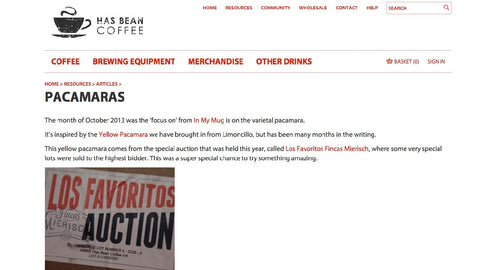Episodes

Saturday Nov 16, 2019
Episode 575: El Salvador Finca San José Washed Red Bourbon
Saturday Nov 16, 2019
Saturday Nov 16, 2019
Finca San José is very much the pride and joy of the Rodríguez family and is now in the hands of a fourth and fifth generation of coffee producers. The story begins in 1815 when José María Rodriguez and Josefina Rodriguez (great-grandparents) planted the first coffee trees with their own hands.
Through the generations, the farm has passed through the hands of many committed farmers like José's son, Israel Rodriguez. He was then followed by Jose Maria Rodriguez, who took care of the farm until it came to Gloria Mercedes Rodriguez Fontán, the most recent owner.
Ever the strong woman, Gloria has overcome gender barriers in an industry that has historically been the province of men, and she personally supervises every step at the farm level. Gloria not only takes care of San José but, together with her siblings' support, she manages five other small farms which collectively add up to 38 hectares.
The mountain slopes of Finca San José are fully shaded by trees that help to maintain and preserve the crop and the surrounding environment. In addition to the trees' diversity, the farm is home to a variety of wild animals and birds, which can be seen in their natural habitat. San José is nested in the northwestern slope of an extinct volcanic crater, which holds a small lagoon inside it. The lagoon is named Nymph Lagoon, due to the abundance of water lilies.
At Finca San José, coffee goes through extensive quality control in addition to being grown under standards that support specialty coffee production. The unique microclimate conditions include an average altitude of 1,500 metres above sea level, an average temperature of 17°C, and rich and loamy clay soil; and the coffee grown is mainly Bourbon.
One of our most consistent coffees, this year it again delivers milk chocolate alongside dark cherries. Those two classic flavours are joined by almond on the finish, for a really more-ish result.
- Country: El Salvador
- Department: Ahuachapán
- Municipality: Apaneca
- Nearest city: El Saitillal
- Farm: Finca San José
- Owner: Gloria Mercedes Rodriguez Fontán
- Farm manager: Antonio Avelino
- Processing method: Washed
- Varietal: Red Bourbon
- Altitude: 1,500 m.a.s.l.
CUPPING NOTES
Milk chocolate, dark cherry, almond
Clean cup: (1–8): 6.5
Sweetness: (1–8): 7
Acidity: (1–8): 6
Mouthfeel: (1–8): 6
Flavour: (1–8): 7
Aftertaste: (1–8): 6
Balance: (1–8): 6.5
Overall: (1–8): 6.5
Correction: (+36): +36
Total: (max. 100): 87.5
Roasting Information
Medium-dark - through first crack and then slow this down a little, you're looking to finish the roast around the end of the gap.

Saturday Nov 09, 2019
Episode 574: Nicaragua Finca Limoncillo Washed Red Pacamara Peaberry
Saturday Nov 09, 2019
Saturday Nov 09, 2019
I've been telling the story of Hasbean and Finca Limoncillo for many, many years now. I don't intend to stop any time soon because it's such a big, big, big relationship for me. 😊
So much of where we are today has come from this relationship. I'm really proud of everything that's happened in the past, and super excited for where we can go in the future.
Our relationship with Finca Limoncillo began in 2007, and back then we were buying their delicious coffee as part of a buying group. I loved it from the very first time I cupped it, and it was a coffee I just had to get. It was only after the auction closed that I discovered it was owned by a family in Nicaragua who were already good friends of mine, and indeed probably the only people I knew from the whole country!
The following year I visited the farm with our importers, and I spent the whole trip begging them to bring the coffee into the UK for us. Eventually, thanks to my supreme Steve pester power, they caved in (probably just to stop the flow of emails and phone calls!) and kindly did so.
This setup worked well for a time, but we received notice a couple of years ago that the importers were not going to be buying the coffee again (and for reasons other than the cup quality). This led to some frantic phone calls and a thorough search down the back of the sofa for loose change to fund buying twelve months’ worth of coffee all at once. There were many, many obstacles in the way of doing this deal, but we were lucky in that we were able to pull everything together in a very short amount of time.
The upside of all of this is that we now work directly with Finca Limoncillo instead of going via anyone else, and this is a relationship I’m super happy to have. This coffee has gone from a one-off Cup of Excellence buy to a fantastic long-term relationship that I'm so very proud to have.
Finca Limoncillo is located in Matagalpa and, at 171 hectares in size, it. is. huge! Situated at an amazing location, it boasts nine waterfalls within the farm and is owned by the Mierisch family; as I have already said, they’re good friends, and also well-respected producers in Nicaragua. They’re known for their experimental processing, varietal work, and exceptional coffee.
The fact that the family are friends helps us drill down into the details of what they do for the people who work for them. The information continues to prove to me that good people grow good coffee.
This is a Pacamara varietal coffee. Pacamaras are a little crazy on the cupping table. Pacamaras are exciting. I like Pacamaras! I could ramble on about Pacamaras for a while ... oh, wait a minute, I did! If you'd like to know more about this fantastic varietal, make sure to have a look at the article I wrote ...
As well as being a big ol' Pacamara, this is also a lil' ol' Peaberry; a thing that's normally big is a little smaller than you might expect. It's an interesting mix of unusual sizing that I hope you'll enjoy.
Normally the seed of the coffee fruit grows into the green bean that we all know and love from two fertilised seeds inside each fruit, but sometimes things are a little different and a Peaberry is born. When only one of the two seeds is fertilised, it produces a smaller bean that looks like a shrunken version of what we'd normally know as a coffee bean, and that's because only one seed has grown instead of two.
Some say Peaberry coffees are sweeter and more delicious than their regular cousins; some people even come to us specifically looking for these coffees because they crave them so much! I'll let you be the judge.
This reminds me of a Custard Cream biscuit - super sweet with a hint of vanilla in the background. There’s just a shoulder of hops in there too, along with a delicate orange acidity which balances it all beautifully.
- Country: Nicaragua
- Municipality: Yasica Norte
- Region: Matagalpa
- Farm name: Limoncillo
- Producers: The Mierisch Family
- Farm size: 171 hectares
- Coffee growing area: 109 hectares
- Altitude: 1,200 m.a.s.l.
- Varietal: Pacamara Peaberry
- Processing method: Washed
CUPPING NOTES
Custard Cream, vanilla, hops, orange
Clean cup: (1–8): 6.5
Sweetness: (1–8): 7
Acidity: (1–8): 6
Mouthfeel: (1–8): 6.5
Flavour: (1–8): 7
Aftertaste: (1–8): 6
Balance: (1–8): 6
Overall: (1–8): 6
Correction: (+36): +36
Total: (max. 100): 87
Roast Information
Medium to medium-dark - through first and try to keep a steady increase in temperature, looking for the very first pops of second on the drop, no more!
Brewing Tip
Pacamaras have a very unique size, density and structure so don't expect them to grind like any other coffee. As this is a Pacamara peaberry they're different even to normal Pacamaras too #tricky
I find going a little finer than I normally would + allowing more time for the grinder to get its teeth into the bigger beans often leads to delicious results. Not quite as far as you'd push your grind for a regular Pacamara but still make sure to tweak what you're doing to help this coffee show off it's natural awesomeness.

Saturday Nov 02, 2019
Episode 573: Kenya Kiriga Estate AA Washed
Saturday Nov 02, 2019
Saturday Nov 02, 2019
The first coffee bush at Kiriga Estate was planted in approximately 1954 by colonial settlers. At about the same time, less than ten kilometres away along the same Kigio road, a young boy (Aloysius Gakunga, son of the chief for the larger Murang'a county) helped his father – Senior Chief Ndungíu Kagori – plant the first coffee seedling in the area. The area was known as Gaitegi village, Muranga Location 1 (Loco One). A love affair with coffee had been born!
Several years went by and the young boy grew up. He was riding his bicycle along Kigio road and, as he rode past the vast – by now well-established – coffee estates, he promised himself that he would one day own one of them.
He realized this dream in 1976.
The boy, or Mr A. N. Gakunga, sadly passed away in July 2014. By the time of his death, Mr Gakunga had passed his love of coffee and the mantle of Kiriga coffee estate on to Dr Brian Ndungíu Gakunga. Brian was his second child, and the eldest son out of his six children. According to Kikuyu cultural naming systems, Brian is named after Mr Gakungaís' father, who was both his grandfather and his pioneer coffee farmer.
- Dr Brian Gakunga is a coffee farmer who is well known in Kenyan coffee circles. He is a founding member and a former long-serving Honorary Secretary of the Kenya Coffee Producers Association, which is a national farmers' organisation that works to promote the economic and social interests of the coffee farmers through active participation in the national and international arena.
- Brian is also a former Board Member and Chairman of Transitional Exchange Committee (operationally, he was the then-Chairman of Nairobi Coffee Exchange), where over 90% of all of Kenya's coffee is currently sold. He's also currently the Founding Chairman of Africa Coffee Farmers' Network.
- Africa Coffee Farmers' Network represents the interests of coffee farmers, as spelt out in the organisation's core objective of improving the earnings of poor coffee farmers in order to break the vicious cycle of poverty. One way of doing this is by getting direct sales for the farmers.
Kiriga Estate sits between 1,550 and 1,650 metres above sea level. It is approximately five kilometres from Thika town, which is an industrial town in the central province of Kenya. It's four kilometres from Blue Posts hotel, which has the famous Chania and Thika falls. Thika lies 50 kilometres northeast of Nairobi.
Administratively, Kiriga coffee estate is in the Gatanga constituency of Muranga county, and it's separated from Kiambu county by the Chania river.
Kiriga coffee is Arabica of predominantly SL28 variety (notable for its world-renowned cup quality). The farm has an estimated two hectares of Ruiru 11 variety (which has improved resistance to coffee berry disease and leaf rust); some K7 variety (similar characteristics as SL28, but with better resistance to leaf rust compared to SL28); and a field of the newest Batian variety. About 60% of the coffee that the estate produces is AA/AB.
All coffee activities at Kiriga are carried out at a factory level, from the coffee nursery to all the farm operations (pruning, weed control, nutrition, irrigation, basin digging, disease control, infilling, mulching, and planting). Wet mill operations are also carried out on the factory level. Kiriga delivers both parchment coffee and Mbuni (naturals) to the commercial dry mill for milling and grading, in preparation for sale at coffee auctions and via indirect sale.
In addition to growing coffee the estate also has, I was told, shoats (sheep and goats), a dairy, and the potential to keep fish. It's all about diversity, and what's more diverse than a 'shoat'?! The estate is also occasionally visited by two hippos, in addition to some bird-life, while also being the home of a family of monkeys.
Kiriga irrigated all its coffee trees – despite the crippling electricity costs involved – during the dry season, in order to ensure their high standards were maintained despite the weather.
By the end of 2015, the estate had changed the cycle of its coffee trees by removing the old heads and growing new heads, which in return gave a higher yield of bold beans with the characteristic 'Kiriga coffee characteristics'. Over 40% of the 'old heads' had to go! This is way above the recommended 25%, and we expect to have decreased yield but increased quality as a result.
At Kiriga they talk about having a 'Kiriga Family'. It's a big family that includes up to 180 people at the busiest times of year! Thirty percent of the total workforce is made up of resident families who live on the estate. Fifty percent of those know no other home. The remaining percentage consists of smallholder farmers who commute daily and depend on the estate for survival. There are smallholder farmers who have been part of the family since 1976 and have no desire to work anywhere else, commuting a whopping 10 KM (or more!) daily – past other estates – just to work at Kiriga.
Something really amazing I wanted to tell you about is the Kiriga Welfare Fund. In the past, the estate saw its workers get turned away from banks when they tried to acquire loans for dealing with family issues or emergencies. To help his 'Kiriga Family', Brian encouraged the workers to set up a welfare group with him as its patron, and Brian has provided money for loaning out to staff according to their most pressing needs.
Many of the estate farms around Kiriga have been sold off to make housing estates. Whilst this is a challenge for the future, in the immediate period Brian is actually finding it helpful, because there are more skilled pickers available (who were working on the other farms).
During my visit to Kenya in 2015, I was fortunate enough to spend some time chatting with Brian. I even managed to record some of it, too! Make sure to have a listen. 😊
Hasblog: An Interview with Brian and Peter from Kiriga (Part 1)
Hasblog: An Interview with Brian and Peter from Kiriga (Part 2)
In the cup this is fruit squash! It starts with blackcurrant, but seamlessly morphs into orange. There is a shoulder of fresh strawberry in the background. It's super clean and super refreshing.
- Country: Kenya
- Constituency: Gatanga
- County: Muranga
- Nearest town: Thika
- Estate: Kiriga
- Farmer: Dr Brian Gakunga
- Altitude: 1,550–1,650 m.a.s.l.
- Varietals: SL 28 AA and Ruiru 11 AA
- Processing method: Washed
CUPPING NOTES
Blackcurrant, orange, strawberry
Clean cup: (1–8): 8
Sweetness: (1–8): 6.5
Acidity: (1–8): 7
Mouthfeel: (1–8): 6
Flavour: (1–8): 7.5
Aftertaste: (1–8): 6
Balance: (1–8): 6
Overall: (1–8): 7
Correction:(+36): +36
Total (max. 100): 90
Roast Information
Medium – keep it pretty quick, through first crack and into the gap; then drop it, really showcasing the acidity.
Brewing Tip
We're noticing that this coffee can tend to extract very easily versus others we are currently roasting. We recommend either a coarser grind than normal, shorter overall brewing time or lowering the amount of coffee you normally use to make a brew - our standard recommendation is 60g/l but try 55g/l and see what you think.

Saturday Oct 26, 2019
Episode 572: Costa Rica Don Joel Finca Carmela Red Honey Villa Sarchi
Saturday Oct 26, 2019
Saturday Oct 26, 2019
The Don Joel Micromill is owned by Allan Oviedo Rodriguez and his family. Right on the border between the Central and Western Valleys in Costa Rica, Allan has been producing coffee there for 18 years. Growing up in a coffee family, Allan learnt the traditional producing methods with his father (Don Joel) and brothers but also saw the difficulties this lifestyle had, with poor returns and increasing cost of living.
When his father passed away, the farms were split up between the family and Allan, working the La Cumbre farm, decided to change how he did things. Building the micromill he named for his father, he set about replanting with a focus on taste quality. It's no surprise that the varietals he chose will be familiar from our range - Caturra, Catuai and Villa Sarchi.
With a mix of a willingness to try new things, an eye for detail and the ability to learn quickly, Allan was able to build a great reputation for consistently and cleverly grown and processed coffees.
A few years ago, Allan was able to invest in expanding his growing area and added this farm - Carmela - alongside La Cumbre. Despite a difficult year for coffee growing in the Western Valley (with high temperatures, unseasonal rain and ash from Poás volcano among the challenges), Allan managed to get a great crop from Carmela.
Carmela is a 3-hectare farm, planted mostly with Villa Sarchi and some Typica. Situated around 1600 masl, it's only 5 minutes drive from La Cumbre but on the opposite edge of the hill. Even in these short distances, Allan's noticed significant differences in the weather, giving each farm it's own character.
Like many producers in Costa Rica, Allan works in a semi-organic way - reducing the use of sprays as much as possible. One of the tricks he does to help this is creating his own fertiliser, using native microorganisms to create a base before including some trace nutrients for the plants which he can then spray on.
This has got a really intense sweetness which reminds me of boiled sweets. There's a big hit of red apple and it finishes with a spoonful of white sugar.
- Country: Costa Rica
- Region: Western Valley
- Nearest City: San Luis de Grecia
- Farm: Finca Carmela
- Micromill: Don Joel
- Producer: Allan Oviedo Rodriguez and family
- Altitude: 1,600 m.a.s.l.
- Processing method: Red Honey
- Varietal: Villa Sarchi
CUPPING NOTES
Red apple, boiled sweets, white sugar
Clean cup: (1–8): 6
Sweetness: (1–8): 7
Acidity: (1–8): 6.5
Mouthfeel: (1–8): 6
Flavour: (1–8): 6
Aftertaste: (1–8): 6
Balance: (1–8): 7
Overall: (1–8): 6.5
Correction:(+36): +36
Total (max. 100): 87
Roast Information:
Medium - nicely through first crack and develop it right to the cusp of second before you drop it.
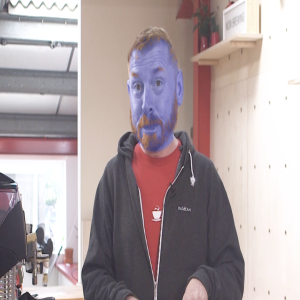
Saturday Oct 19, 2019
Episode 571: Ethiopia Ana Sora Natural
Saturday Oct 19, 2019
Saturday Oct 19, 2019
We're now into our fourth wonderful year of having coffee from Ana Sora, and I'm as excited this year as I was back in 2016! This coffee represents lots of time and energy working at the farmer's gate in Ethiopia, and it's one of the most unique coffees I've ever tasted.
My inbox has been full of emails asking for more, more, more Ana Sora! Well, here you go folks. 😀
We also have a washed version of the same coffee, which you can find here. Make sure you try them side by side if you get the chance, so you can enjoy the delicious variations that the different processing methods bring to the cup.
This private farm is owned by Israel Degfa, a second-generation coffee grower from Ethiopia and as coffee farms go, it's a very new farm: it was only formed in 2013. It's located at a whopping altitude of between 1,900 and 2,350 metres above sea level. It's a gorgeous but somewhat tiring walk to get there! (It's not all just holiday snaps, this coffee buying malarkey!)
Situated alongside the river Turo, the farm used to only produce naturally processed coffee. However, over the last year, the farmers have taken advantage of the water source and have begun producing washed coffee too.
It is unusual to find private farms of 250 hectares in Ethiopia, and even more unusual to find them at such high altitudes. The altitude helps with the slower maturation of the coffee cherry and allows more time for the plant to develop, which contributes to the super unique cup profile we see in coffees from Ethiopia.
Coffee growing is popular in this area, and Israel also sources coffee from the surrounding area. That area is populated by smallholder farmers who speak Oromife and are of Oromo ethnicity. Israel believes in helping these farmers through education in husbandry, and also through financial assistance.
Cherries are hand-sorted for unripes and overripes before they go into floatation tanks, where they're covered with water. Any cherries that float are removed. Whole, ripe cherries are then dried in the sunshine on raised African drying beds, which are laid out on hessian cloths for about 15–18 days depending on the weather conditions. The cherries are covered with plastic or shade nets during the midday heat and at night.
It's a unique coffee from a unique relationship, and I'm massively excited to share this coffee with you once again.
Do you like blueberries? I hope so!!! This coffee is all about the blueberries: think drinking blueberry juice whilst eating a blueberry muffin. It's not just the flavour of blueberry though. It's got a silky texture that reminds me of fruit juice, and a delicate lemon zest on the aftertaste, which is a perfect complement to all the blueberries.
- Country: Ethiopia
- Area: Guji zone
- Nearest town: Yirgacheffe
- Farm: Ana Sora
- Varietal: Indigenous wild varietals
- Processing: Natural
- Owner: Israel Degfa
- Founding year: 2013
- Altitude: 1,900–2,350 m.a.s.l.
- Farm size: 250 hectares, of which 150 hectares are coffee
CUPPING NOTES
Blueberry juice, blueberry muffin, lemon zest
Clean cup: (1–8): 7
Sweetness: (1–8): 7
Acidity: (1–8): 6.5
Mouthfeel: (1–8): 7
Flavour: (1–8): 8
Aftertaste: (1–8): 6.5
Balance: (1–8): 6
Overall: (1–8): 8
Correction: (+36): +36
Total: (max. 100): 92
Roasting Information
Medium – through first crack and into the gap. For more fruit, drop this mid-way through the gap; for more of that silky body, extend the roast slightly and drop just before second gets going.

Saturday Oct 12, 2019
Episode 570: Nicaragua Las Delicias Washed Longberry
Saturday Oct 12, 2019
Saturday Oct 12, 2019
This farm was brand new to us only a few years ago, and we're really happy to have been able to continue getting coffee from Las Delicias every year since. Although the farm itself is still relatively new to us, the people behind it most certainly aren't. In fact, we've been working with them for over ten years now.
The Mierisch family (whom you may remember from such farms as Limoncillo, Mama Mina, Escondida and Milligros) have worked with us over that time to bring us delicious coffee, and continue to do so year after year. 😊
Much of that deliciousness is thanks to their amazing processing, and Eleane Mierisch is in charge of that. She works in the family business, but she's never owned her own farm. Never, that is, until two years ago, when she acquired Las Delicias all for herself.
The farm is located in the region of Jinotega at an average altitude of 1,450 metres above sea level. It's located next to another Mierisch farm that you might have heard of, which is called San José. We've had coffee from there a few times; we're definitely hoping to see more in the future, too.
Eleane knows the area very well, and she knows the land and what it's capable of producing. Add to this her passion for coffee, and you can start to understand why she wanted to produce coffee on a farm of her own.
The Longberry varietal is the fruit of some of the amazing experimental work that's taking place at Limoncillo, another Mierisch farm (as if I even need to tell you that!) To explain a little bit of the story behind it, I'll hand over to another Mierisch that I just so happen to know. Oh hi there, Erwin!
Here my 'story' begins back in mid-2001. I sound like a grandfather ...
My father and I were coming back from visiting some top farms in Nicaragua, as we sometimes did – and do – in order to learn from our neighbours. If we discover anything worthwhile, we then implement those things to improve efficiency and quality on our own farms.
As we drove past the UNICAFE experiment station Juanetillo, which had gone under, a man on the side of the road flagged us down and explained to us how the experiment station had closed down and that his 'severance' was tools and coffee seeds since they did not have the cash to pay him. He asked if we would be interested in helping him out by purchasing these items off of him. In all honesty, I was not very happy that my father forced me to stop to see what this man wanted; therefore, I was not very receptive to his offer, but I purchased a bag of seeds and old beaten up shovels. I gave no immediate thought to the 20 lb bag of coffee seeds that was labelled as JAVA.
My father later showed these seeds to our then-supervising agronomist Ing. Patricia Contreras, who had worked at that research station, and she was ecstatic. She told us about how great this coffee was, but also that it was not very productive nor resistant to disease, as she recalled from running this study at Juanetillo back in the '80s. She also said that the real name for it is Longberry, and that it has its roots in Ethiopia.
We began to run some more experiments – various altitudes and processing methods – and have been learning how to manage it since.
As far as we can tell the Longberry varietal is a Typica-type coffee because of its bean shape, as is the Geisha. Its physical appearance is a uniform seed that is elongated and has been described by several of our customers as an 'Ethiopian Long Berry type'.
The first thing I get with this coffee is the texture – it's creamy. That's backed up by the flavour of single cream, but sitting alongside a clean pear. On the finish it's got a little dark chocolate too, delivering a very elegant cup.
- Country: Nicaragua
- Municipality: Lipululu
- Region: Jinotega
- Farm name: Las Delicias
- Farmer: Eleane Mierisch
- Farm size: 20 manzanas (hectares)
- Coffee growing area: 20 hectares
- Altitude: 1,450 m.a.s.l.
- Varietal: Longberry
- Processing method: Washed
CUPPING NOTES
Single cream, pear, dark chocolate
Clean cup: (1–8): 7
Sweetness: (1–8): 6.5
Acidity: (1–8): 6.5
Mouthfeel: (1–8): 7
Flavour: (1–8): 7
Aftertaste: (1–8): 6
Balance: (1–8): 6
Overall: (1–8): 7
Correction: (+36): +36
Total: (max. 100): 88
Roasting Information
Medium – go through first crack but give this a little longer in the gap and push it towards second, finishing just on the edge of second crack.

Saturday Oct 05, 2019
Episode 569: Guatemala El Bosque Washed Bourbon
Saturday Oct 05, 2019
Saturday Oct 05, 2019
Situated on a hillside which runs parallel to the main road to Guatemala City, sits El Bosque. Due to it's proximity to the Capital, it faces threats from ever-expanding urban development but for the time we have been working with El Bosque, prices and returns for the farm have made it a much higher concern for the brothers, and they are very motivated.
Before I'd tried this coffee at El Bosque, it was love at first taste, I was absolutely blown away by how good it was! However, my first visit to the farm in January 2007 really cemented this, because I got to learn more about the awesome people behind the coffee.
In 1932, Julian Flores founded the farm and the fourteen-hectare extension of land was planted out with Bourbon varietal coffee, which was cultivated and sold in cherry form only. Over the next few years, with the acquisition of more land, the farm continued to grow. Julian Flores passed away in 1947 and his son, José Eladio Flores, inherited the farm and continued his father’s legacy of growth. By 1970, José had bought another 23 hectares and continued to grow and sell the same Bourbon coffee varietal. After his death in 1996, a third-generation has taken the farm on under the direction of José’s widow, Martha Stalla, and their sons Julio, José, Francisco and Mario.
Now, this third-generation, headed up by Don Roberto, has focused on innovation, and they have built a plant for processing the cherries in line with strict environmental guidelines. They have also branched into cultivating other plants for local consumption, such as avocados, roses and lemons as well as growing a new grass innovation.
There's a big toffee at the start of this - it's really chewy with a sweetness which reminds me of treacle toffee. As soon as that initial toffee goes, there's a hazelnut which jumps in, before it finishes with a little dark chocolate.
- Country: Guatemala
- Department: Guatemala Department
- Municipality: Villa Canales
- Town: Amatitlán
- Farm: El Bosque
- Farmer: Flores family
- Farm size: 37 hectares
- Coffee growing area: 14 hectares
- Altitude: 1,400–1,645 m.a.s.l.
- Variety: Bourbon
- Processing system: Washed
CUPPING NOTES
Treacle toffee, hazelnut, dark chocolate
Clean cup (1–8): 6
Sweetness (1–8): 6.5
Acidity (1–8): 6
Mouthfeel (1–8): 7
Flavour (1–8): 6.5
Aftertaste (1–8): 6.5
Balance (1–8): 6.5
Overall (1–8): 6
Correction (+36): +36
Total: (max. 100): 87
Roasting Information
Medium-dark - get this through crack and give it some time to develop the toffee flavours before you drop it with the first pops of second.

Saturday Sep 28, 2019
Episode 568: Ethiopia Ana Sora Washed
Saturday Sep 28, 2019
Saturday Sep 28, 2019
We're now into our fourth wonderful year of having coffee from Ana Sora, and I'm as excited this year as I was back in 2016!
My inbox has been full of emails asking for more, more, more Ana Sora! Well, here you go folks. 😀
In the past we only had a naturally processed coffee (check it out here!) from the farm. This year we also have a washed version. Make sure you try them side by side if you get the chance, so you can enjoy the delicious variations that the different processing methods bring to the cup.
This private farm is owned by Israel Degfa, a second-generation coffee grower from Ethiopia and as coffee farms go, it's a very new farm: it was only formed in 2013. It's located at a whopping altitude of between 1,900 and 2,350 metres above sea level. It's a gorgeous but somewhat tiring walk to get there! (It's not all just holiday snaps, this coffee buying malarkey!)
It is unusual to find private farms of 250 hectares in Ethiopia, and even more unusual to find them at such high altitudes. The altitude helps with the slower maturation of the coffee cherry and allows more time for the plant to develop, which contributes to the super unique cup profile we see in coffees from Ethiopia.
Coffee growing is popular in this area, and Israel also sources coffee from the surrounding area. That area is populated by smallholder farmers who speak Oromife and are of Oromo ethnicity. Israel believes in helping these farmers through education in husbandry, and also through financial assistance.
The classic washed Yirgacheffe flavours are right there: black tea with a bergamot edge. The classic floral notes are there too, reminding me of apple blossom. There's also a delicate baker's chocolate in the finish, and a white sugar sweetness that lifts this into something very special.
- Country: Ethiopia
- Area: Guji zone
- Nearest town: Yirgacheffe
- Farm: Ana Sora
- Varietal: Indigenous wild varietals
- Processing: Washed
- Owner: Israel Degfa
- Founding year: 2013
- Altitude: 1,900–2,350 m.a.s.l.
- Farm size: 250 hectares, of which 150 hectares are coffee
CUPPING NOTES
Black tea, bergamot, apple blossom, baker's chocolate, white sugar
Clean cup: (1–8): 7
Sweetness: (1–8): 7
Acidity: (1–8): 6.5
Mouthfeel: (1–8): 6
Flavour: (1–8): 7.5
Aftertaste: (1–8): 6
Balance: (1–8): 6
Overall: (1–8): 7
Correction: (+36): +36
Total: (max. 100): 89
Roasting Information
Medium – through first, keep it fairly quick and drop this mid-way through the gap between cracks.

Saturday Sep 21, 2019
Episode 567: Kenya Othaya Chinga Peaberry Washed
Saturday Sep 21, 2019
Saturday Sep 21, 2019
I took my very first trip to Kenya back in 2014. My aim was not to meet producers but rather to get an insight into how the market works, and how we can improve the quality of the coffee we buy from Kenya.
Much of Kenya's coffee comes from cooperatives, which means it's tough to go to visit a person or build a long-term relationship. That said, it is possible to get something interesting going and to work on projects together by speaking with the leaders of the co-ops and washing stations.
Othaya Farmer's Cooperative is based at the Gatuyaini wet mill, just north of Othaya town. In the town there's a cupping room (and a talented QC person) and a new addition: a small roastery (where they hope to develop a market for their coffee inside Kenya). Othaya has many different wet mills in the co-operative, and we buy from one of the smallest – Chinga. Situated just south of Othaya town, the mill was built in the 1960s on the banks of the Gikira river.
The mill has some 783 members, and each member owns only a small piece of land of an average 0.3 acres. Members of co-operatives pick their coffee cherries and deliver them to a local mill like Chinga. At Chinga, the workers collect the cherries and, when they have enough, they put them through the washed process as a batch. Such a batch is called an Outturn.
For each Outturn, the cherries are sorted before being depulped and emptied into large vats filled with clean, cold water. The cherries ferment there until the remaining fruit parts have come away from the beans. They get floated (which separates out the ripe, dense beans from lower quality ones) before being dried on raised beds.
When I think Kenyan coffee I think blackcurrant, and that's in there. But there's also citrus, which makes me think of pink grapefruit and blood orange, and a little nudge of pomegranate. It's crisp and refreshing, but a little caramel on the aftertaste leaves a lingering sweetness.
- Country: Kenya
- Province: Nyeri
- District: Othaya
- Affiliated with: Othaya Farmer's Cooperative
- Farm: Chinga
- Processing method: Washed
- Varietal: Peaberry
- Average rainfall: 1,200–1,500 mm
- Altitude: 1,795 m.a.s.l.
- Coordinates: 0°34'45.4"S 36°55'35.2"E
- Soil: rich volcanic loam
CUPPING NOTES
Pink grapefruit, blackcurrant, blood orange
Clean cup: (1–8): 7
Sweetness: (1–8): 6.5
Acidity: (1–8): 8
Mouthfeel: (1–8): 6
Flavour: (1–8): 6.5
Aftertaste: (1–8): 6
Balance: (1–8): 6
Overall: (1–8): 7
Correction:(+36): +36
Total (max. 100): 89
Roasting Information
Medium – take it a little hotter, push through first crack, and then drop at the end of the gap to ensure good development.
Brewing Tip
We're noticing that this coffee can tend to extract very easily versus others we are currently roasting. We recommend either a coarser grind than normal, shorter overall brewing time or lowering the amount of coffee you normally use to make a brew - our standard recommendation is 60g/l but try 55g/l and see what you think.
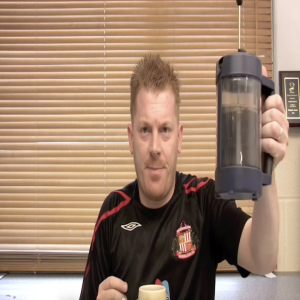
Saturday Sep 14, 2019
Episode 566: El Salvador Finca La Fany Natural Bourbon
Saturday Sep 14, 2019
Saturday Sep 14, 2019
Rafael and Carmen De Silva were the first producers I ever met in El Salvador, and Finca La Fany was the first farm I ever visited in El Salvador. This is a relationship that goes all the way back to 2003, and I consider this to be a real foundation stone coffee for Hasbean.
Finca La Fany has been producing coffee in El Salvador since 1870, and it's belonged to the same family from generation to generation. Situated on the Santa Ana volcano, the farm provides work for 24 families in the community. It's in a biological corridor that stretches for 27 hectares from Mexico to Panama. It grows mostly Bourbon, but also has a small amount of Pacamara.
Carmen and Rafael continually invest in the milling of their own coffee and improving the facilities they have, which has really driven this shade-grown coffee to just get better and better year after year. We think you can really taste the continuous development in the cup; this is one of our all-time favourites, and it's one of the coffees that we'd be absolutely devastated to lose if we were ever unable to get it.
This is one of the cleanest Natural processed coffees you'll find. It's green apple with just a hint of a cider edge to it, and shifts into raisins on the finish. As it fades, there's chocolate in the aftertaste, which pulls you back in for another sip.
- Country: El Salvador
- Department: Ahuachapán
- Municipality: Apaneca
- Farm: La Fany
- Farmer: Carmen and Rafael Da Silva
- Farm size: 20.30 hectares
- Coffee growing area: 20.30 hectares
- Altitude: 1,450 m.a.s.l.
- Varietal: Bourbon
- Processing system: Natural
CUPPING NOTES
Green apple, cider, raisin, chocolate
Clean cup: (1–8): 8
Sweetness: (1–8): 6
Acidity: (1–8): 7
Mouthfeel: (1–8): 6
Flavour: (1–8): 6.5
Aftertaste: (1–8): 6
Balance: (1–8): 6
Overall: (1–8): 6.5
Correction:(+36): +36
Total: (max. 100): 87.5
Roast Information
Medium dark – through first, let it develop and drop with the first pops of second crack as it hits the cooling tray.
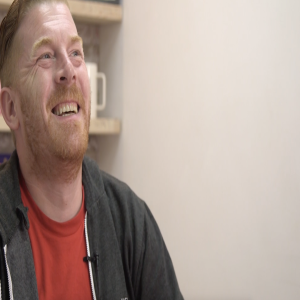
Saturday Sep 07, 2019
Episode 565: Nicaragua Finca La Escondida Washed Red Catuai
Saturday Sep 07, 2019
Saturday Sep 07, 2019
Finca La Escondida is close to Lake Apanas near the city of Jinotega, which is the capital of the department of Jinotega in the north-central region of Nicaragua.
The straight translation from Spanish to English of 'escondida' is ‘hidden’. The farm is called 'Escondida' because it's 'hidden' from the road by forest and trees, which makes it appear to blend right into the side of the mountain.
In the grand scheme of coffee farm things, La Escondida is still a rather young farm. The first trees were planted there in 2006; just thirteen years ago. La Escondida was planned around identifying the plots with individually different micro-environments resulting from factors such as soil quality, sun exposure and temperature range. This is one of the upsides of planting a new farm: getting to plan ahead!
The varietal of this lot is Red Catuai. The owners selected it for the farm because they thought it would do well with the soil quality, sun exposure, temperature range and weather conditions, given the farm's quite exposed on the side of the mountain.
Catuai is related to Yellow Caturra and Mundo Novo, and it's a hybrid that grows best above 800 metres. It is most prevalent in Brazil and Central/South America. This is a dwarf variety of plant; it doesn't grow very high, and this is its most obvious distinguishing trait. Selected by the Instituto Agronomico in the 1950s, it now accounts for 50% of the coffee acreage in Brazil and is widely used in Central America. It also benefits from the fruit not falling off the branch easily. This helps when there are strong winds or rain, or where windbreaker coverage is at a minimum – like it is at this farm.
This may not be Terry's, but it's definitely chocolate orange. There's a sprinkle of brown sugar too before a light zest of lime on the aftertaste.
- Country: Nicaragua
- Department: Jinotega
- Farm: La Escondida
- Farm manager: Boanerje Martinez Montenegro
- Coffee growing area: 92 manzanas
- Altitude: 975–1,230 m.a.s.l.
- Varietal: Red Catuai
- Processing method: Washed
CUPPING NOTES
Chocolate orange, brown sugar, lime zest
Clean cup: (1–8): 6
Sweetness: (1–8): 7
Acidity: (1–8): 6
Mouthfeel: (1–8): 6.5
Flavour: (1–8): 6.5
Aftertaste: (1–8): 6
Balance: (1–8): 6.5
Overall: (1–8): 6
Correction: (+36): +36
Total: (max. 100): 86.5
Roast Information
Medium dark – through first crack and extend the development slightly before dropping just as you reach second crack.
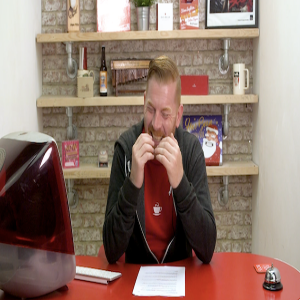
Saturday Aug 31, 2019
Episode 564: El Salvador Finca La Fany Washed Bourbon
Saturday Aug 31, 2019
Saturday Aug 31, 2019
Rafael and Carmen De Silva were the first producers I ever met in El Salvador, and Finca La Fany was the first farm I ever visited in El Salvador. This is a relationship that goes all the way back to 2003, and I consider this to be a real foundation stone coffee for Hasbean.
Finca La Fany has been producing coffee in El Salvador since 1870, and it's belonged to the same family from generation to generation. Situated on the Santa Ana volcano, the farm provides work for 24 families in the community. It's in a biological corridor that stretches for 27 hectares from Mexico to Panama. It grows mostly Bourbon, but also has a small amount of Pacamara.
Carmen and Rafael continually invest in the milling of their own coffee and improving the facilities they have, which has really driven this shade-grown coffee to just get better and better year after year. We think you can really taste the continuous development in the cup; this is one of our all-time favourites, and it's one of the coffees that we'd be absolutely devastated to lose if we were ever unable to get it.
This is brown sugar, milk chocolate and hazelnut. It's full and round with a delicate white grape on the finish. A chugging coffee through and through.
- Country: El Salvador
- Department: Ahuachapán
- Municipality: Apaneca
- Farm: La Fany
- Farmer: Carmen and Rafael Da Silva
- Farm size: 20.30 hectares
- Coffee growing area: 20.30 hectares
- Altitude: 1,450 m.a.s.l.
- Varietal: Bourbon
- Processing system: Washed
CUPPING NOTES
Brown sugar, milk chocolate, hazelnut, white grape
Clean cup: (1–8): 6
Sweetness: (1–8): 6.5
Acidity: (1–8): 6
Mouthfeel: (1–8): 6.5
Flavour: (1–8): 6.5
Aftertaste: (1–8): 6
Balance: (1–8): 7
Overall: (1–8): 6.5
Correction:(+36): +36
Total: (max. 100): 87
Roast Information
Medium dark – just into the first pops of second crack and drop.
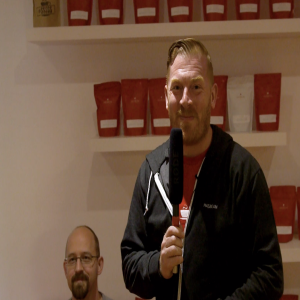
Tuesday Aug 27, 2019
Episode 563: Honduras Finca Cerro Azul Natural Longberry
Tuesday Aug 27, 2019
Tuesday Aug 27, 2019
Cerro Azul is one of the Mierisch family’s newer coffee projects in Honduras. The name 'Mierisch' might sound familiar; they have brought us Limoncillo, Escondida, San Jose and Mama Mina, to name just a few of their amazing farms.
The Mierisch family have been growing coffee for four generations, going on five, in Nicaragua. They have achieved great results with their special way of farming, and more importantly by reaching out to specialty buyers and being at the forefront of coffee development.
This farm started life as an experiment for the Mierisch family. To farm here, they went across the border of their mother country and drove six hours from their home to neighbouring Honduras.
I've spoken with Erwin a lot about why the family made this decision, and it came down to his experiences as one of the Head Judges for the Cup of Excellence competitions in Honduras. He had seen amazing potential, but he'd also seen a lack of care and attention to detail during the processing stage. This detail is vital to truly special coffee, and Erwin and his family are some of the best-qualified processing technicians I have ever met. This opportunity was a match made in heaven.
In 2011 they started the project of revitalising Finca Cerro Azul in the region of the national park, Azul Meambar. It's in Siguatepeque, Comayagua, Honduras, and is across from Finca El Cielito, Santa Barbara. The farm lies on the other side of Lake Yojoa, and is blessed with micro-climates and conditions which are familiar to the family because those conditions are similar to the ones they experience on their lands in Nicaragua.
But the soil is something else, as is the plant stock they have inherited. We were some of the first to taste the fruits of their hard work and long drives to their new farm.
All aboard the funky bus! For me this is sweet, sticky macerated strawberries all over, with a little bit of peach on the side. There's a shoulder of pecan on the aftertaste too. Anyone else wanting dessert now?
- Country: Honduras
- Department: Comayagua
- Municipality: Siguatepeque
- Community: Rio Bonito
- Farm: Finca Cerro Azul
- Farm managers: Francisco Escobar and Lidia Zeledon
- Farm owners: The Mierisch family
- Area: 135 hectares
- Elevation: 1,450–1,900 m.a.s.l.
- Varietal: Longberry
- Processing method: Natural
CUPPING NOTES
Macerated strawberries, peach, pecan
Clean cup: (1–8): 6
Sweetness: (1–8): 7
Acidity: (1–8): 6.5
Mouthfeel: (1–8): 6.5
Flavour: (1–8): 7
Aftertaste: (1–8): 6.5
Balance: (1–8): 6
Overall: (1–8): 7
Correction:(+36): +36
Total (max. 100): 88.5
Roast Information
Medium – don't be afraid to throw heat at it. Keep pushing through the gap, and then drop right at the end of the gap.

Saturday Aug 17, 2019
Episode 562: Guatemala El Libano Washed
Saturday Aug 17, 2019
Saturday Aug 17, 2019
This farm was originally called 'La Pampa'. It was purchased by Mr Prudencio Perez Rosales in 1915. When he unfortunately passed away, his daughters inherited the farm and divided it equally into three properties called La Pampa, San Juan, and El Libano. Herbert purchased El Libano in 1992.
In the early days of El Libano (or La Pampa, I guess I should say) coffee was commercialised in cherry form with other farms and/or buyers who took it to local wet mills for the post-harvest process. When coffee production at the farm increased between 1958 and 1960, a wet mill was built on a lower part of the farm and drying fields were built in the higher parts.
At that time, coffee was taken by workers on mules from the pulping area to the drying fields. This was down a narrow road, which (as I'm sure you can imagine) made work rather difficult. This was extended in 1970, and thanks to increasing coffee sales they were able to buy a vehicle to let the mules get some rest.
There have been many changes to the farm since then. They improved the quality of what they could produce via modernisation of the wet mill and the pulping area, and by improving the drying process. In the drying area they have increased the drying patios and added a guardiola dryer, which has the capacity of processing 40 quintales (4 kilos) of coffee.
Besides producing delicious coffee, El Libano also plays a really important role for the local people. The farm's workers have been provided with equipped houses to live in on the farm with their families, and they've also built not just one but two modern swimming pools for workers and their families!
It's located in the traditional Guatemalan coffee region of Chimaltenango. It's 21 hectares in size, with 17.5 of them set aside for coffee production. Its owner is Herbert Estuardo Perez Liquidano, who is a third generation coffee producer on this farm.
The farm sits at 1,350 metres above sea level, and it grows a mixture of Typica, Bourbon, Caturra, Pache, Pache Colis and Geisha coffee. This lot is a mixture of Caturra, Typica, and Bourbon.
If you've got a sweet tooth, this one's for you - it's full on Orange Fruit Pastille. There's a hint of milk chocolate too, with an aftertaste which reminds me of cocoa nibs.
- Country: Guatemala
- Department: Chimaltenango
- Municipality: Acatenango
- Nearest village: La Pampa
- Farm name: El Libano
- Farmer: Herbert Estuardo Pérez Liquidano
- Altitude: 1,350 m.a.s.l.
- Processing method: Washed
- Drying: Sun dried
- Farm size: 21 hectares
- Coffee growing area: 17.5 hectares
- Varietal: Caturra, Typica, and Bourbon
CUPPING NOTES
Orange Fruit Pastille, milk chocolate, cocoa nibs.
Clean Cup: (1-8): 6
Sweetness: (1-8): 7
Acidity: (1-8): 6.5
Mouthfeel: (1-8): 6
Flavour: (1-8): 6.5
Aftertaste: (1-8): 6.5
Balance: (1-8): 6.5
Overall: (1-8): 6
Correction:(+36): +36
Total (max 100): 87
Roasting Information
Medium - Medium Dark - Through first and let it develop a little, but this one can shine anywhere from the end of the gap into the first pops of second, depending on your preference.

Saturday Aug 10, 2019
Episode 561: Costa Rica Finca Licho Yellow Honey
Saturday Aug 10, 2019
Saturday Aug 10, 2019
Licho's is a coffee that I feel shows our development as a roaster over the years. We first bought this coffee in the Cup of Excellence program (a great way to meet a grower). Back then we bought it from an import broker; they helped us bring in this coffee because we are a small coffee buyer. Now we buy directly from the farm!
Four years ago, I went out to the farm and did the deal then and there with the brothers. I love the fact that I simply walked onto the farm after cupping a particular lot in the exporter's office, asked how much they wanted, and there was a short conference. They came back and told me how much they wanted, and then we shook hands. Then we got back into the 4x4 and drove away. That year we agreed a European-exclusive deal with them for this coffee, and this year we continue the close work we have been doing with them.
Grown by the Aguilera brothers in the province of Naranjo, in the volcanic Northern Cordiles corridor of the Western Valley, this coffee is cultivated at an altitude of 1,500 metres above sea level. Most of their coffee is of the Villa Sarchi variety, which is native to the area and excellent in the cup. Villa Sarchi is a Bourbon mutation (similar to Caturra and Pacas) originally found in Naranjo. It's a dwarf variety with short internodes and (usually) higher-yielding production.
The Aguileras are twelve brothers and sisters, all of whom are involved in coffee as inherited from their parents. The brothers work the mill and farms themselves with basically no hired labour except for pickers during the harvest. With the help of the third generation, they work the mill and drying patios, prune the coffee fields, fertilise, and so on; and they do it all year round. The Aguilera brothers understand quality at the farm and mill level, and this is why we are excited about working with them.
This coffee is honey processed, which is like the pulped natural method. The fruit is removed from the seed of the coffee bush and left to dry. The main difference is that there is no water involved when the cherry is removed, so mucilage sticks to the bean. This can be dangerous, but it's necessary in these parts of Costa Rica where water is limited: water is a precious commodity in this area of Naranjo, so this method suits the location very well.
The coffee ends up clustering whilst drying because there is so much mucilage. So the coffee either needs to be turned regularly to stop this happening, or it has to be broken up. Over-fermentation can happen at this stage and you can end up with a not-so-good cup, but the Aguilera brothers are well-versed in this method and are some of the most skilled in Costa Rica.
Want to know a little more about honey processing? Here's a video you might enjoy!
In the cup this has loads of fruity sweetness. It's apricot and raspberry mashed up, but with a lovely syrupy texture that makes this as much a crowd-pleaser this year as it is every year.
- Country: Costa Rica
- Region: Western Valley
- Province: Alajuela
- Nearest city: Naranjo de Alajuela
- Farm: Finca Licho
- Producers: Aguilera family
- Farm size: 28.00 hectares
- Coffee growing area: 9.10 hectares
- Altitude: 1,500 m.a.s.l.
- Varietal: 70% Villa Sarchí and 30% Caturra
- Processing system: Yellow Honey
CUPPING NOTES
Apricot, raspberry, syrupy
Clean cup: (1–8): 6
Sweetness: (1–8): 7
Acidity: (1–8): 6.5
Mouthfeel: (1–8): 6.5
Flavour: (1–8): 6.5
Aftertaste: (1–8): 6
Balance: (1–8): 6.5
Overall: (1–8): 7
Correction:(+36): +36
Total: (max. 100): 88
Roast Information
Medium – take it through first crack and slow it down a bit, dropping before you reach second.
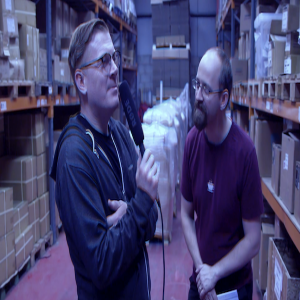
Saturday Aug 03, 2019
Episode 560: El Salvador Finca Argentina Washed Bourbon
Saturday Aug 03, 2019
Saturday Aug 03, 2019
I've been working with Alejandro Martinez since way, way back in 2008, and in that time our relationship has gone from strictly professional to Alé being one of my closest friends.
He became involved in coffee in 2008 because he had just relocated to El Salvador from New York, where he'd been working as a city banker. With his first son on the way and the hustle and bustle of New York being no place to bring up a family, the draw of home and El Salvador was just far too strong to ignore.
While looking for work in El Salvador, Ale decided to help his father with some of his business interests and investments. His father had inherited several coffee farms from his grandfather and was unsure what to do with them. One of the investments pricked Ale’s interest, and this was a farm called Finca Argentina. The reason it really got Ale's attention was that he saw the farm once yielded loads of coffee but was producing a fraction of its old productivity. His father gave him permission to see what could be done to make the farm successful again.
Ale found out the farm had been classified for a Q auction back in 2005. Thinking there may be a specialty buyer out there, he and his cousin (who lived in London) went about sending samples to coffee roasters anywhere they could. One of those samples arrived at Has Bean Towers, just like a lot of other samples do; unusually, I liked the coffee, and the rest – as they say – is history.
Since then Finca Argentina has gone from strength to strength, but not without bumps in the road. In 2013 it suffered the worst harvest on record, with only 70 bags harvested due to a massive issue with leaf rust. But with investment and hard work, the farmers have also bought a neighbouring farm, and the future is amazingly bright for Ale, his father, his family and Finca Argentina.
The farm is based in the Apaneca-Ilamtepec mountain range, and is near the town of Turin in the Ahuachapán department. Sixteen people work on the farm during the non-picking season, maintaining and tending to the plants. This number of workers goes up to 50 people during the picking period. The altitude of the farm is 1,300 metres above sea level (m.a.s.l.).
This coffee is 100% Bourbon, as 70% of plant stock in El Salvador is. This heirloom varietal is one of the reasons why coffee from this country is right up amongst some of the best in the world. They have the perfect climate and conditions for this low yielding, high maintenance strain.
This is such an easy-drinking coffee – think hot chocolate with hints of green apple and a fruity sweetness to it. That's wrapped up with a little hit of cocoa powder on the finish.
- Country: El Salvador
- District: Ahuachapán
- Municipality: Ahuachapán
- Nearest city: Turin
- Farm: Finca Argentina
- Owner: Alejandro Martinez
- Altitude: 1,300 m.a.s.l.
- Varietal: Bourbon
- Processing method: Washed
- Drying method: Patios
CUPPING NOTES
Hot chocolate, green apple, cocoa powder
Clean cup: (1–8): 6
Sweetness: (1–8): 6.5
Acidity: (1–8): 6
Mouthfeel: (1–8): 6
Flavour: (1–8): 6.5
Aftertaste: (1–8): 6
Balance: (1–8): 7
Overall: (1–8): 7
Correction:(+36): +36
Total (max. 100): 87
Roast Information
Medium dark – through first crack, and then steadily up to the very first pops of second as it finishes.

Saturday Jul 27, 2019
Episode 559: Kenya Karagoto Washed Peaberry
Saturday Jul 27, 2019
Saturday Jul 27, 2019
Quite close to Kieni near the town of Karatina, Nyeri is the Karagoto wet mill. It's owned by the Tekangu Coffee Farmers Cooperative Society, which got its name from combining the names of their three mills: Tegu, Karogoto and Ngunguru. Much like Kieni, it has seen success in recent years and has secured some really great prices for the farmers that deliver their coffee cherries there.
The mill is split in half by a road, with the sorting shed and fermentation tanks on the lower side and the drying beds on the upper slope of the hill. Both sides are pretty steep, with a great view of the valley and weaver birds making their homes in the trees around the mill.
Ephraim Maina Muthee, who showed us around when we visited in 2016, manages the mill and Steve planted a coffee plant with him on the slope just below the sorting shed.
Normally the seed of the coffee fruit grows into the green bean that we all know and love from two fertilised seeds inside each fruit, but sometimes things are a little different and a Peaberry is born. When only one of the two seeds is fertilised, it produces a smaller bean that looks like a shrunken version of what we'd normally know as a coffee bean, and that's because only one seed has grown instead of two.
Some say Peaberry coffees are sweeter and more delicious than their regular cousins; some people even come to us specifically looking for these coffees because they crave them so much! I'll let you be the judge.
Ever had caramelised orange? This coffee is full of it. There's a little blackcurrant edge and it's sightly sherbet-like too.
- Country: Kenya
- County: Nyeri
- Nearest town: Karatina
- Mill: Karagoto
- Owners: Tekangu Coffee Farmers Cooperative Society
- Contributing farmers: 1,700+
- Altitude: 1,700 m.a.s.l.
- Varietal: Peaberry
- Processing method: Washed
- Average rainfall: 1,500 mm
- Temperature range: 12–27°C
- Soil type: Well-drained red volcanic soil rich in phosphorus
CUPPING NOTES
Caramelised orange, blackcurrant, sherbet
Clean cup: (1–8): 6
Sweetness: (1–8): 7
Acidity: (1–8): 6.5
Mouthfeel: (1–8): 7
Flavour: (1–8): 6.5
Aftertaste: (1–8): 6
Balance: (1–8): 6
Overall: (1–8): 7
Correction: (+36): +36
Total: (max. 100): 88
Roast Information
Medium - through first and keep it going fairly quickly through the gap, dropping the roast just before second crack gets going.
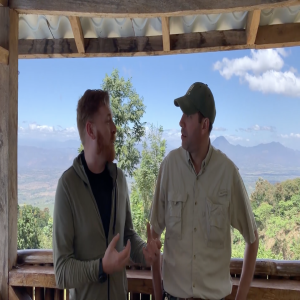
Saturday Jul 20, 2019
Episode 558: El Salvador Finca Argentina Piletas Natural Bourbon
Saturday Jul 20, 2019
Saturday Jul 20, 2019
I've been working with Alejandro since 2008 and in that time our relationship has gone from strictly professional to Ale being one of my closest friends. He became involved in coffee in 2008 as he had just relocated to El Salvador from New York where he'd been working as a city banker. With his first son on the way and the hustle and bustle of New York no place to bring up a family the draw of home and El Salvador was just far too strong to ignore.
While looking for work in El Salvador, Ale decided to help his father with some of his business interests and investments. His father had inherited several coffee farms from his grandfather and was unsure what to do with them, one of the investments pricked Ale’s intent and this was a farm called Finca Argentina. The reason it really got Ale's attention was that he saw the farm once yielded loads of coffee but was producing a fraction of its old productivity. His father gave him permission to see what could be done to make the farm successful again
Ale found out the farm had been classified for a Q auction back in 2005. Thinking there may be a specialty buyer out there he and his cousin (who lived in London) went about sending samples to coffee roasters anywhere they could. 1 of those samples arrived at Hasbean Towers just like a lot of other samples do, but unusually I liked the coffee and the rest, as they say, is history.
Since then Finca Argentina has gone from strength to strength but not without bumps in the road. In 2013 they suffered the worst harvest on record, with only 70 bags harvested due to a massive issue with leaf rust. But with investment and hard work they have also bought a neighbouring farm and the future is amazingly bright for Ale, his father, his family and Finca Argentina.
The farm is based in the Apaneca-Ilamtepec mountain range, and is near the town of Turin in the Ahuachapán department. Sixteen people work on the farm during the non-picking season, maintaining and tending to the plants. This number of workers goes up to 50 people during the picking period. The altitude of the farm is 1,300 m.a.s.l.
The coffee is 100% Bourbon, as 70% of plant stock in El Salvador is. This heirloom varietal is one of the reasons why coffee from this country is right up amongst some of the best in the world. They have the perfect climate and conditions for this low yielding, high maintenance strain.
Before he'd met me Ale hadn't done any natural processing, maybe he misses the days before he had someone like me pestering him with silly ideas! But I like to think this coffee proves we did a good thing convincing him to give it a go.
In the cup this is a sweet and juicy natural - lots of raisins and candied fruit peel is backed up by a creamy sweetness that makes me think of a crème brûlée - right down to the little hints of caramel.
- Country: El Salvador
- District: Ahuachapán
- Municipality: Ahuachapán
- Nearest city: Turin
- Farm: Finca Argentina
- Owner: Alejandro Martinez
- Altitude: 1,300 m.a.s.l.
- Varietal: Bourbon
- Processing method: Natural
- Drying method: Raised African beds
CUPPING NOTES
Raisin, candied peel, crème brûlée, caramel
Clean Cup: (1-8):
Sweetness: (1-8): 6.5
Acidity: (1-8): 6
Mouthfeel: (1-8): 7
Flavour: (1-8): 7
Aftertaste: (1-8): 6
Balance: (1-8): 6.5
Overall: (1-8): 6
Correction:(+36): +36
Total (max 100): 87
Roast Information
Medium - Nice and quick through first crack, drop just at the start of second crack.

Saturday Jul 13, 2019
Episode 557: Costa Rica ARBAR Finca Manantial Red Honey
Saturday Jul 13, 2019
Saturday Jul 13, 2019
When we found this farm for the very first time all the way back in 2013 we knew very little about it, so little in fact that the coffee didn't even have an official name! Back then all we knew was that the coffee was grown by a gentleman called Carlos Arrieta and it was really, really delicious! However, since then I've been lucky enough to visit Carlos on my trips to Costa Rica and, over the past few years, have found out lots more.
The farm is located in the Western Valley region near to the town of Lourdes de Naranjo. It's located at 1,600 meters above sea level and contains mostly Caturra, Catuai + a tiny bit of Villa Sarchi, there are also plans to plant some small micro lots too in the future. El Manantial is actually one of Carlos's four farms...
- La Casa - mostly planted with Geisha and Kenya!
- La Isla - not in production yet
- El Oasis - slightly smaller than El Manantial and produces around 6,000kg of fresh cherries each year
- El Manantial - around 3 hectares in size and produces around 8,500kg of fresh cherries each year (amounts to just over 1,000kg of green coffee when processed)
Carlos runs the farm with his wife and children, Maria Isabel, Yessica, Karen, Esteban and Jose Ignacio. He has owned this farm for almost twenty years but only started processing the coffee himself in 2014 (while still paying someone else to pulp it for him). He hadn't been able to present his coffee to a single buyer previously, so he would send it to the exporter we use in Costa Rica and, thankfully, that's how we found him!
The mill name "ARBAR" comes from the combined family names - Carlos ARietta and Maria BARboza - ARBAR. Their children are Yessica, Karen, Esteban & Jose Ignacio.
Carlos is very active in the local community and they have close relationships with their neighbours - which includes CoE winning mills like Herbazu, Vista Al Valle and Sumava. They operate mostly Organic processes, but aren’t Organic certified. They believe in the value of biodiversity on the farms and plants like fruit trees are positioned amid the coffee plants for shade and to help the soil - as well as providing food for the family. They have 1 full-time employee who lives on the farm.
Their latest project is La Isla. This small plot of land belongs to Maria’s niece. Carlos and Maria have agreed an arrangement with her where they will plant and farm the plot and share the profits with her, but this is still very early in it’s production life.
Activity from the Poás volcano at the start of 2019 has impacted the Western Valley region, really quite badly in some areas. Although ARBAR appears to have been lucky with this, we won’t know the final impact until next years crop.
In the cup this is super sweet but clean - think orange squash with some extra white sugar. There's a shoulder of peach too, before it changes into mango on the finish.
- Country: Costa Rica
- Region: Western Valley
- Town: Lourdes de Naranjo
- Farm: Finca El Manantial
- Farmer: Carlos Arrieta
- Micro mill: ARBAR
- Altitude: 1,600 m.a.s.l.
- Varietals: Caturra & Catuai
- Processing system: Red Honey
CUPPING NOTES
Orange squash, white sugar, peach
Clean Cup: (1-8): 6.5
Sweetness: (1-8): 6.5
Acidity: (1-8): 6.5
Mouthfeel: (1-8): 6
Flavour: (1-8): 7
Aftertaste: (1-8): 6
Balance: (1-8): 6.5
Overall: (1-8): 6.5
Correction:(+36): +36
Total (max 100): 87.5
Roast Information
Medium - all the way through first, drop it right at the end of the gap.
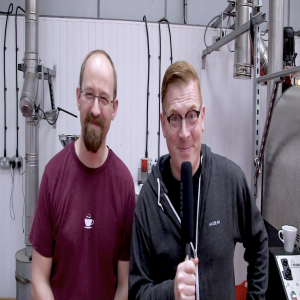
Saturday Jul 06, 2019
Episode 556: El Salvador Finca Argentina Washed Catimor
Saturday Jul 06, 2019
Saturday Jul 06, 2019
I've been working with Alejandro Martinez since way, way back in 2008, and in that time our relationship has gone from strictly professional to Alé being one of my closest friends. He became involved in coffee in 2008 as he had just relocated to El Salvador from New York, where he'd been working as a city banker. With his first son on the way and the hustle and bustle of New York no place to bring up a family, the draw of home and El Salvador was just far too strong to ignore.
While looking for work in El Salvador, Ale decided to help his father with some of his business interests and investments. His father had inherited several coffee farms from his grandfather and was unsure what to do with them. One of the investments pricked Ale’s interest, and this was a farm called Finca Argentina. The reason it really got Ale's attention was that he saw the farm once yielded loads of coffee but was producing a fraction of its old productivity. His father gave him permission to see what could be done to make the farm successful again.
Ale found out the farm had been classified for a Q auction back in 2005. Thinking there may be a specialty buyer out there, he and his cousin (who lived in London) went about sending samples to coffee roasters anywhere they could. One of those samples arrived at Hasbean Towers, just like a lot of other samples do; unusually, I liked the coffee, and the rest – as they say – is history.
Since then Finca Argentina has gone from strength to strength, but not without bumps in the road. In 2013 they suffered the worst harvest on record, with only 70 bags harvested due to a massive issue with leaf rust. But with investment and hard work, they have also bought a neighbouring farm, and the future is amazingly bright for Ale, his father, his family and Finca Argentina.
The farm is based in the Apaneca-Ilamtepec mountain range, and is near the town of Turin in the Ahuachapán department. Sixteen people work on the farm during the non-picking season, maintaining and tending to the plants. This number of workers goes up to 50 people during the picking period. The altitude of the farm is 1,300 m.a.s.l.
This coffee is a washed process Catimor, which perhaps you may raise an eyebrow at because the Catimor varietal can be a little on the controversial side, but after many years of delicious Catimors from Finca Argentina I expect better from you! Catimor is a cross between Timor coffee (resistant to leaf rust – a big problem at the moment in Central America) and Caturra coffee. It was created in Portugal, of all places, in 1959.
Catimor grows and produces fruit very quickly and has a very high yield. It's pest resistant and leaf rust resistant, and it will grow well at much lower altitudes – better, in fact, in comparison to many other commercial varietals. Sounds perfect, but problems come in the cup quality. Timor has its feet in the Robusta species (hence all these lovely benefits), but Robusta is not known for being tasty.
This is one of the finest examples of this varietal I have ever seen, and it came about because of Alé wanting to experiment with different varietals on different parts of the farm, and 1 of those experiments involved Catimor. It's a great example of tasting a coffee with your taste buds and not letting what you think it might taste like get in the way.
Like the Bourbon from the farm, this brings sweet fruit and chocolate. In this case, it's peaches and yellow plums against that familiar dusting of cocoa powder. There's an extra edge here though - a delicate spicy, black pepper like kick which makes this super interesting.
- Country: El Salvador
- District: Ahuachapán
- Municipality: Ahuachapán
- Nearest city: Turin
- Farm: Finca Argentina
- Owner: Alejandro Martinez
- Altitude: 1,300 m.a.s.l.
- Varietal: Catimor
- Processing method: Washed
- Drying method: Patios
CUPPING NOTES
Spicy, yellow plum, peach, cocoa.
Clean Cup: (1-8): 6
Sweetness: (1-8): 6
Acidity: (1-8): 6
Mouthfeel: (1-8): 6
Flavour: (1-8): 7
Aftertaste: (1-8): 6.5
Balance: (1-8): 6.5
Overall: (1-8): 7
Correction:(+36): +36
Total (max 100): 87
Roasting Information:
Medium Dark - push this through to the very first pops of second. Being a Catimor, it generally goes a little hotter than a Bourbon.
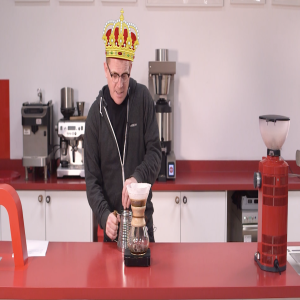
Saturday Jun 29, 2019
Episode 555: Kenya Kiriga Estate AB Washed
Saturday Jun 29, 2019
Saturday Jun 29, 2019
The first coffee bush at Kiriga estate was planted in approximately 1954 by colonial settlers. At about the same time, less than ten kilometres away along the same Kigio road, a young boy (Aloysius Gakunga, son of the chief for the larger Murang'a county) helped his father – Senior Chief Ndungíu Kagori – plant the first coffee seedling in the area. The area was known as Gaitegi village, Muranga Location 1 (Loco One). A love affair with coffee had been born!
Several years went by and the young boy grew up. He was riding his bicycle along Kigio road and, as he rode past the vast – by now well-established – coffee estates, he promised himself that he would one day own one of them.
He realized this dream in 1976.
The boy, or Mr A. N. Gakunga, sadly passed away in July 2014. By the time of his death, Mr Gakunga had passed on the love of coffee, and the mantle of Kiriga coffee estate, to Dr Brian Ndungíu Gakunga. Brian was his second child, and his eldest son out of his six children. According to Kikuyu cultural naming systems, Brian is named after Mr Gakungaís' father, who was both his grandfather and the family's pioneer coffee farmer.
- Dr Brian Gakunga is a coffee farmer who is well known in Kenyan coffee circles. He is a founding member and a former long-serving Honorary Secretary of the Kenya Coffee Producers Association, which is a national farmers' organization that works to promote the economic and social interests of the coffee farmers through active participation in the national and international arena.
- Brian is also a former Board Member and Chairman of Transitional Exchange Committee (operationally, he was the then-Chairman of Nairobi Coffee Exchange), where over 90% of all of Kenya's coffee is currently sold. He's also currently the Founding Chairman of Africa Coffee Farmers' Network.
- Africa Coffee Farmers' Network represents the interests of coffee farmers, as spelled out in the organisation's core objective of improving the earnings of poor coffee farmers in order to break the vicious cycle of poverty. One way of doing this is by getting direct sales for the farmers.
The Kiriga estate sits between 1,550 and 1,650 metres above sea level. It is approximately five kilometres from Thika town, which is an industrial town in the central province of Kenya. It's four kilometres from Blue Posts hotel, which has the famous Chania and Thika falls. Thika lies 50 kilometres northeast of Nairobi.
Administratively, Kiriga coffee estate is in the Gatanga constituency of Muranga county, and it's separated from Kiambu county by the Chania River.
Kiriga coffee is Arabica of predominantly SL28 variety (notable for its world-renowned cup quality). The farm has an estimated two hectares of Ruiru 11 variety (which has improved resistance to coffee berry disease and leaf rust); some K7 variety (similar characteristics as SL28, but with better resistance to leaf rust compared to SL28); and a field of the newest Batian variety. About 60% of the coffee that the estate produces is AA/AB.
All coffee activities at Kiriga are carried out at a factory level, from the coffee nursery to all the farm operations (pruning, weed control, nutrition, irrigation, basin digging, disease control, infilling, mulching, and planting). Wet mill operations are also carried out on the factory level. Kiriga delivers both parchment coffee and Mbuni (naturals) to the commercial dry mill for milling and grading, in preparation for sale at the coffee auction and indirect sale.
In addition to growing coffee, the estate has shoats (sheep and goats), a dairy, and the potential to keep fish. It's all about diversity, and what's more diverse than a 'shoat'?! The estate is also occasionally visited by two hippos, houses some bird life, and is the home of a family of monkeys.
Kiriga irrigated all its coffee trees – despite the crippling electricity costs involved – during the dry season that happened recently, in order to ensure the farm's high standards were maintained despite the weather.
By the end of 2015, the estate had changed the cycle of its coffee trees by removing the old heads and growing new heads, which in return gave a higher yield of bold beans with 'Kiriga coffee characteristics'. Over 40% of the 'old heads' had to go! This is way above the recommended 25%, and as a result, we expect to see decreased yield but increased quality.
At Kiriga they talk about having a 'Kiriga Family', and it's a big family that reaches up to 180 people at the busiest times of year! Thirty percent of the total workforce is made up of resident families who live on the estate, and half of those know no other home. The remaining percentage consists of smallholder farmers who commute daily and depend on the estate for survival. There are smallholder farmers who have been part of the family since 1976 and have no desire to work anywhere else. Some commute a whopping 10 KM (or more!) daily, past other estates, just to work at Kiriga.
Something really amazing I wanted to tell you about is the Kiriga Welfare Fund. In the past, the estate saw its workers get turned away from banks when they tried to acquire loans for dealing with family issues or emergencies. To help his 'Kiriga Family', Brian has encouraged the workers to set up a welfare group with him as its patron, and Brian has provided money for loaning out to staff according to their most pressing needs.
Brian has also approached a banking institution to see whether it can fund workers to acquire dairy animals on loan and repay from the milk proceeds. Under such an arrangement, 50% of the proceeds would go towards paying for the loan. A market would be readily available, and the remaining 50% would be extra income to the workers. This is ongoing and, if successful, it would have the effect of supplementing the workers' wages and greatly improving their quality of life.
Many of the estate farms around Kiriga have been sold off to make housing estates. Whilst this is a challenge for the future, in the immediate period Brian is actually finding this helpful because there are more skilled pickers available (who were working on the other farms).
During my visit to Kenya in 2015, I was fortunate enough to spend some time chatting with Brian. I even managed to record some of it, too! Make sure to have a listen. :)
Hasblog: An Interview with Brian and Peter from Kiriga (Part 1)
Hasblog: An Interview with Brian and Peter from Kiriga (Part 2)
In the cup we're on a trip to Blackcurrant City!! There's an edge of black tea and a hint of cherry sweets on the finish, but blackcurrant screams and shouts all the way.
- Country: Kenya
- County: Muranga
- Constituency: Gatanga
- Nearest town: Thika
- Estate: Kiriga
- Farmer: Dr Brian Gakunga
- Altitude: 1,550–1,650 m.a.s.l.
- Processing method: Washed
- Varietals: SL28 AB & Ruiru 11 AB
CUPPING NOTES
Blackcurrant, cherry, black tea
Clean Cup: (1-8): 7
Sweetness: (1-8): 6.5
Acidity: (1-8): 7
Mouthfeel: (1-8): 6
Flavour: (1-8): 8
Aftertaste: (1-8): 6.5
Balance: (1-8): 6.5
Overall: (1-8): 7.5
Correction:(+36): +36
Total (max 100): 91
Roast Information
Medium - Through first and into the gap, but don't let this near second. A bit more development will highlight sweetness whilst keeping the pace quick will focus on that acidity - delicious either way.

Saturday Jun 22, 2019
Episode 554: Kenya Kamundu SL 34 AB Sundried Natural
Saturday Jun 22, 2019
Saturday Jun 22, 2019
Kiambu county is located just outside of Nairobi city. The region has a long history of coffee production and is really rather famous for its large estates, which were originally built by British colonists in the early 20th century.
After decolonisation, the estates were sold to local Kenyans who have been managing them since. While estates such as this used to produce the majority of Kenyan coffee, the increased urban sprawl from Nairobi, as well as the increasing land value in the region has meant that estate coffee production has gradually diminished, while smallholder production elsewhere has increased. Nevertheless, estates such as Kamundu Estate continue a legacy of many generations of coffee production, supported by unparalleled local knowledge and experience.
This coffee is naturally processed on raised African beds. Natural processing is quite rare in Kenya, it's much more common to see fully washed coffees.
Ripe cherries are selectively harvested and floated to select only the ripest, highest quality cherries for processing. These cherries are placed in a single layer on raised drying beds and dried in the sun for up to 6 weeks. The cherries must be manually turned periodically every day to ensure an even drying and prevent mould formation. Once the coffee has reached its optimum moisture content it is rested before being hulled, graded further by hand, and finally bagged in GrainPro for export.
In the cup this really is blackcurrant squash. Blackcurrants are front and centre, but there's also a little hint of rhubarb in there. All that's wrapped up neatly by a super interesting blueberry aftertaste.
- Country: Kenya
- Region: Kiambu
- Estate: Kamundu
- Estate Size: 155 hectares
- Altitude: 1,950 m.a.s.l.
- Varietal: SL 34
- Grade: Kenya AB
- Screen Size: 16
- Processing method: Sundried Natural - Raised African Beds
- Soil: Rich, volcanic, red and sandy soil
CUPPING NOTES
Blackcurrant squash, rhubarb, blueberry.
Clean cup: (1–8): 7
Sweetness: (1–8): 6
Acidity: (1–8): 7
Mouthfeel: (1–8): 6
Flavour: (1–8): 7
Aftertaste: (1–8): 6.5
Balance: (1–8): 6
Overall: (1–8): 6.5
Correction: (+36): +36
Total: (max. 100): 88
Roast Information
Medium - through first and well into the gap, but drop this before you get to second.

Saturday Jun 15, 2019
Episode 553: Bolivia Waliki Washed Typica
Saturday Jun 15, 2019
Saturday Jun 15, 2019
"Waliki?"
"Waliki."
Waliki is an Ayamara greeting, meaning "how's everything?" to which the correct response is... "Waliki" meaning "all good". As the word is so ingrained into the local culture, the Rodriguez family (who own this farm) naturally decided it should be named just that, and here we are!
This is the first time we've bought any coffee from this farm as it's still very young (It was first planted in 2016!) But it has a great story behind it in that it is the first farm that the Rodriguez family have tried 100% Organic production of both Typicas and Javas to establish whether this is a reliable means of coffee production in Bolivia.
Although it's grown and farmed using Organic processes, the farm is yet to have official Organic certification, but we think it tastes awesome either way!
In the cup you'll get an up front zing which reminds me of green melon, but that doesn't last as sweet chocolate orange floods in immediately after. The texture is smooth and silky, enhancing that chocolate flavour.
- Country: Bolivia
- Region: Caranavi
- Farm: Waliki
- Farm Size: 3.6 Hectares
- Farmer: Los Rodriguez
- Altitude: 1650 m.a.s.l
- Variety: Typica
- Processing system: Mechanically Washed
CUPPING NOTES
Green Melon, Chocolate Orange, Silky
Clean Cup: (1-8): 6.5
Sweetness: (1-8): 7
Acidity: (1-8): 6
Mouthfeel: (1-8): 7
Flavour: (1-8): 6
Aftertaste: (1-8): 6
Balance: (1-8): 7
Overall: (1-8): 6
Correction:(+36): +36
Total (max 100): 87.5
Roast information
Medium Dark - take it through first crack and slow it down a little to extend the development slightly, then increase the heat to reach the first pops of second just as you finish the roast.

Saturday Jun 08, 2019
Episode 552: Nicaragua Finca La Isla AA Washed
Saturday Jun 08, 2019
Saturday Jun 08, 2019
Owned by Juan José Montoya, Finca La Isla (or The Island Farm) is thus called because the farm is isolated from the town by a river. Around 50% of Finca La Isla is made up of natural forests, which generates great biodiversity on the farm and there are also permanent water streams running through the land. Juan José considers that what makes Finca La Isla so special is its closeness to the nature, its perfect climate, its altitude, and the passion with which he produces coffee in the company of his brother.
Juan José started producing commodity coffee here back in 2012 but as the price of commodity coffee started to drop below the cost of production, he started to look into other options. Luckily, Juan José had some super tasty and high-quality coffees on his farm and with his 2018-2019 harvest he decided to sell his coffee in the specialty market for the first time.
And here we are! I was recently over in Nicaragua cupping new lots and thought I was pretty much sorted for coffees from the area until this one fell into my lap and I decided we should definitely throw it into the mix!
In the cup this is cacao nibs with a delicious digestive biscuit kind of sweetness. Mixed in is a delicate fruity edge - a hint of lychee. The aftertaste is clean and refreshing, reminding me of pear drops.
- Country: Nicaragua
- Municipality: San Ramón
- Region: Matagalpa
- Farm name: La Isla
- Farmer: Juan José Montoya
- Farm size: 714 hectares
- Coffee growing area: 294 hectares
- Altitude: 900-1,200 m.a.s.l.
- Varietal: Caturra, Catuai, Catimor and Paraneima
- Process: Fully Washed
CUPPING NOTES
Cacao nibs, digestive biscuit, lychee
Clean cup: (1–8): 6
Sweetness: (1–8): 6.5
Acidity: (1–8): 6
Mouthfeel: (1–8): 6
Flavour: (1–8): 6.5
Aftertaste: (1–8): 6.5
Balance: (1–8): 6.5
Overall: (1–8): 6
Correction: (+36): +36
Total: (max. 100): 86
Roasting Information
Medium to Medium Dark - this one's pretty quiet in crack, so steady through first and develop it a bit before second gets going.

Saturday Jun 01, 2019
Episode 551: Bolivia David Vilca
Saturday Jun 01, 2019
Saturday Jun 01, 2019
David Vilca's farm is located in Illimani in the Los Yungas region of Bolivia, near to the city of Caranavi. The farm didn't originally actually have an actual name so was named after its producer, it's quite a common thing in Bolivia as farms are often named after an individual or the family running them rather than being given a specific name.
David migrated from La Paz to the farm seventeen years ago after a career in mining left him with damaged hearing and seeking a different course. He bought a twelve-hectare farm as security for himself and his family, to make sure that they could support themselves.
When he took over the farm he only had one acre planted with coffee and it was Criolla, after two years David was comfortable with coffee farming and started to expand what he was doing. He was becoming increasingly interested in the possibilities of what he could accomplish and decided to extend the coffee plantation area - he's now up to a whopping five acres land that produces coffee. He has very little outside help with the farm, except from his direct family and I'd like to give a very special nod to his wife who I know helps him greatly.
The varietals grown on the farm are Typica, Caturra, Catuai and a very small amount of Criolla that's still growing from when David first bought the land. The farm is under constant improvement - David removed much of the Criolla that was originally growing so he could put more focus on the Typica, Caturra and Catuai, for cup quality reasons. This lot is a mixture of all the varietals on the farm, excluding Criolla. Although maybe we'll be able to get some 1 year just for fun, I'll speak to David.
I have a really good relationship with David, and you might remember that a number of years ago we did something a little different with the coffee's price. I've visited a couple of times now but on my first visit to the farm I thought he was being rude to me by ignoring pretty much everything I was saying, or not just responding when I spoke to him. Afterwards, I found out that David's hearing had become damaged whilst he was working as a miner before he made the move into coffee and oh, he wasn't being rude, he just couldn't hear me!
In the past, the exporter had given David some money to get hearing aids to help with exactly that situation, but he spent the money on satellite TV (for his wife – who hasn’t been in that situation!). So a couple of years ago we paid for two hearing aids while we were there so that he could hear properly again and enjoy my smooth and soothing Cannock accent #yamyam ;) yamyamyam 🍠
We thought that would be the last we'd hear of it, but when I next visited, David didn’t have his hearing aids in. He told us that they were not good while he was picking what to wear, but also that he couldn’t afford the batteries. So we left him with cash for a microphone hearing-device for around his neck, and $200 for batteries. This worked out at 7p per bag for all the coffee we buy from him, and I didn't pick up the tab – you lovely people did! So a big THANK YOU from me, and also, of course, from David!
http://www.hasblog.co.uk/the-cost-of-hearing
The farm sits between 1,550 and 1,700 metres above sea level and this coffee is a mechanically washed coffee that underwent full wet fermentation for 16 hours before being dried on raised beds and in a stationary dryer.
In the cup this is a super interesting coffee. It starts out with a dark caramel sweetness with notes of blackcurrant and plum alongside a heavy, gloopy texture. At the same time, there's also a delicate effervescence which pairs with those dark flavours really well and for me, it just screams Cola.
- Country: Bolivia
- Region: Illimani
- Farmer: David Vilca
- Altitude: 1,550–1,700 m.a.s.l.
- Varietals: Typica, Caturra & Catuai
- Ripe cherry colour: Red & yellow
- Processing method: Washed
- Washing method: Mechanical
- Fermentation: Full wet
- Fermentation time: 16 hours
- Drying method: Raised beds + stationary dryer
- Other farm products: Citrus fruits, yuca, banana.
CUPPING NOTES
Cola, dark caramel, blackcurrant, plum.
Clean cup: (1–8): 6
Sweetness: (1–8): 7
Acidity: (1–8): 6
Mouthfeel: (1–8): 7
Flavour: (1–8): 7
Aftertaste: (1–8): 6
Balance: (1–8): 7
Overall: (1–8): 7
Correction:(+36): +36
Total (max. 100): 89
Roast Information
Medium dark - keep this one nice and steady, through first and just up to the cusp of second before you drop the roast.

Saturday May 25, 2019
Episode 550: Tanzania Burka/Selian Estate Natural
Saturday May 25, 2019
Saturday May 25, 2019
The Burka Coffee Estate is located on the outskirts of Arusha national park, on the leeward side of Mt. Meru, just 80 km west of Mount Kilimanjaro, Africa’s highest peak. Situated close to the Kenyan border, this north-westerly region of Tanzania is famous for the coffee it produces.
Burka Coffee Estate was founded in 1899 by German settlers just outside the town of Arusha in Northern Tanzania. The neighbouring Selian Estate was established in 1910 and acquired by Burka in 1991. The first coffee trees were planted in 1918 and now number some 1.3 million mostly shade-grown varietals. 314 acres are reserved for forests and a further 250 acres to natural grasslands. There are around 200 permanent staff at Burka, a further 200 casual daily staff and up to 5,000 temporary staff involved in the picking and sorting at the height of harvest season. All permanent staff are provided with housing on the Estates with salary set at least 20% above minimum government requirements.
Staff have social security and Labour Union membership included in their contracts, and an Estate credit union also offer loans and advice for education, health and house construction. Each estate has its own nursery which educates over 100 children, and two primary schools also cater for over 600 children, from the Estate workers and the neighbouring communities. An onsite health centre with Estate nurse and dispensary is available for all staff, and the Estate has its own ambulance, along with shops, sport facilities and churches and a mosque. Regular inter-Estate and inter-camp football & netball matches occur, along with staff BBQ’s and other holiday celebrations. Workers are supplied with free firewood from stumped coffee trees, fruit & nut trees are grown around the staff villages.
The staff at Burka have a combined wealth of agronomic experience and over the course of many decades the estates have built a reputation for consistent production of fine arabica coffees characterised by mild acidity with flavours of lemon, chocolate & caramel.
Harvesting is carried out between the months of May to October through selective handpicking of red ripe cherries, followed by further hand-sorting to remove any over or under-ripe cherries. Cherries are then dried slowly on raised African beds for 12 - 14 days. The cherries are carefully maintained through consistent turning to ensure even drying and avoid over-fermentation. They are covered at night to protect them from excess rain and moisture. Once the cherries have dried to the optimum moisture content they are sent to Moshi for hulling, grading by bean size and careful handpicking before being bagged in GrainPro for export from the port & capital city of Dar Es Salaam.
In the cup this is a big, chewy coffee with loads of liquorice and a creamy finish. As it cools, look out for prunes and a hint of tobacco leaf.
- Country: Tanzania
- Region: Arusha
- District: Arumeru
- Estate: Burka/Selian
- Estate size: 343 hectares
- Varietals: Kent, N39, Blue Mountain and Catimor
- Processing method: Natural
- Drying method: Raised African beds
- Drying time: 12–14 days
- Altitude: 1,350 m.a.s.l.
- Soil: Young alluvial, sandy to clay loam
- Average annual rainfall: 750 mm
CUPPING NOTES
Liquorice, prune, tobacco leaf.
Clean cup: (1–8): 6
Sweetness: (1–8): 7
Acidity: (1–8): 6
Mouthfeel: (1–8): 7
Flavour: (1–8): 7
Aftertaste: (1–8): 6
Balance: (1–8): 6.5
Overall: (1–8): 6.5
Correction: (+36): +36
Total: (max. 100): 88
Roast Information
Medium dark - through first crack, slow it down and drop just as you get to second crack.

Saturday May 18, 2019
Episode 549: Ethiopia Bollodu Washed
Saturday May 18, 2019
Saturday May 18, 2019
Aramo is in Yirgacheffe district in the ‘Southern Nations, Nationalities & Peoples’ (SNNP) region of Ethiopia. Over a number of years, the region has developed a distinguished reputation for fine coffees, producing some of the most sought-after microlots in the world. The combination of high altitude (up to 2,200 metres above sea level in some areas), fertile soil, consistent and plentiful rains, and an abundance of local knowledge are all contributing factors to the high status of Yirgacheffe coffees.
The indigenous ‘wild’ varietals which grow in Ethiopia are responsible for the unique flavour notes which make for an unusual but distinctive cup. When Ethiopian coffees are out of season and unavailable many of you come to us looking for recommendations and they can be tricky as these delicious Ethiopian coffees are so unique and hard to replace.
Ripe cherries are delivered to the wetmill for careful sorting and pulping, before fermentation for 36-48 hours, depending on the climactic conditions. After this point, the parchment coffee is thoroughly washed and graded by bean density before being dried in the sun on raised African beds for 12-15 days (until the ideal moisture level has been reached). In the daytime, the parchment needs to be raked and turned periodically to ensure a consistent drying process. The coffee is also covered between 12 pm and 3 pm to protect it from the hot sun, and at night time to protect it from rainfall and moisture. Once the coffee has dried to the right level it is transported to Addis Ababa for dry-milling, grading, intensive sorting and handpicking, before being bagged in GrainPro for export.
In the cup this is a classic, super floral washed Yirgacheffe. Expect upfront jasmine, before white sugar and lemon rind appear alongside it. The last component of that classic Yirgacheffe is the black tea, which only hits you on the aftertaste.
- Country: Ethiopia
- District: Yirgacheffe
- Zone: Gedeo
- Region: Southern Nations, Nationalities & Peoples' (SNNP)
- Mill: Bollodu
- Mill Manager: Abiyot Ageze
- Number of Farms: 650-750
- Farm Size: 2 hectares per farmer (Average)
- Altitude: 1,900-2,100 m.a.s.l.
- Processing Method: Fully Washed
- Fermentation Time: 36-48 Hours
- Drying Method: Raised African Beds
- Drying Time: 12-15 Days
- Varietal: Indigenous Wild Varietals
- Soil: Fertile, red-brown, well drained and 1.5m depth
CUPPING NOTES
Floral, jasmine, white sugar, lemon rind, black tea
Clean cup: (1–8): 7
Sweetness: (1–8): 6
Acidity: (1–8): 6.5
Mouthfeel: (1–8): 6
Flavour: (1–8): 6.5
Aftertaste: (1–8): 7
Balance: (1–8): 6
Overall: (1–8): 7
Correction: (+36): +36
Total: (max. 100): 88
Roast Information
Medium - nice and steady through first crack and then drop the roast in the gap between cracks.

Saturday May 11, 2019
Episode 548: Peru Hermes Sandoval El Laurel Washed Organic
Saturday May 11, 2019
Saturday May 11, 2019
Though coffee arrived in Peru relatively early - in the middle of the 1700s - it wasn’t cultivated for commercial export until nearly the 20th century, with increased demand from Europe and the significant decrease in coffee production in Indonesia. British presence and influence in the country, in particular, helped increase and drive exports: In the early 1900s, the British government took ownership of roughly 2 million hectares of land from the Peruvian government as payment on a defaulted loan, and much of that land became British-owned coffee plantations.
As in many Central and South American countries, as the large European-owned landholdings were sold or redistributed throughout the 20th century, the farms became smaller and more fragmented, offering independence to farmers but also limiting their access to resources and a larger commercial market. Unlike many other countries whose coffee economy is dominated by smallholders, however, Peru lacks the organization or infrastructure to provide economic or technical support to farmers—a hole that outside organizations and certifications have sought to fill. Around 30 percent of the country’s smallholders are members of democratic co-ops, which has increased the visibility of coffees from the area, but has done little to bring incredibly high-quality lots like this into the spotlight. The country has a remarkable number of certified-organic producers and this coffee from Hermes is the first we are stocking with our shiny new organic certification! It's something we've been really keen to do for a long time and, long story short, we've gone and done it. You can look forward to seeing more certified organic coffees over the coming months, you're welcome!
As of the 2010s, Peru is one of the top producers of Arabica coffee, often ranked fifth in world production and export of Arabica. The remoteness of the coffee farms and the incredibly small size of the average farm has prevented much of the single-farm differentiation that has allowed for microlot development and marketing in other growing regions, but as with everything else in specialty coffee, this is changing quickly as well. The country’s lush highlands and good heirloom varieties offer the potential for growers to beat the obstacles of limited infrastructure and market access, and as production increases, we are more likely to see those types of advancements.
Hermes Sandoval Huaman has a 6.5-hectare farm where he grows 3.5 hectares of coffee, a mix of Caturra and Pache. After being picked ripe, the coffee is depulped the same or the following day, then fermented dry for 22 hours. After the fermentation is done, the coffee is washed three times in fresh water to remove the mucilage, and dried on beds and patios for an average of 15–20 days.
In the cup I want you to think of a juicy poached pear - there's even a tiny shoulder of red wine in there. Then in swings cacao nibs on the finish and a hint of cinnamon on the aftertaste.
- Country: Peru
- Region: Cajamarca
- Province: San Ignacio
- District: Chirinos
- Nearest Town: La Palma
- Farm: El Canal - El Laurel
- Farm size: 6.5 hectares
- Coffee growing area: 3.5 hectares
- Farmer: Hermes Sandoval Huaman
- Altitude: 1,890 m.a.s.l.
- Varietals: Caturra & Pache
- Processing method: Washed
- Fermentation method: Dry, 22 hours
- Drying method: Beds and patios, 15-20 days
- Certifications: Organic
CUPPING NOTES
Poached pear, red wine, cacao nibs, cinnamon.
Clean Cup: (1-8): 6
Sweetness: (1-8): 6
Acidity: (1-8): 6
Mouthfeel: (1-8): 6
Flavour: (1-8): 7
Aftertaste: (1-8): 7
Balance: (1-8): 7
Overall: (1-8): 6
Correction: (+36): +36
Total: (max 100): 87
Roast Information
Medium dark - nice and slow in the gap between cracks and then drop just at the start of second.
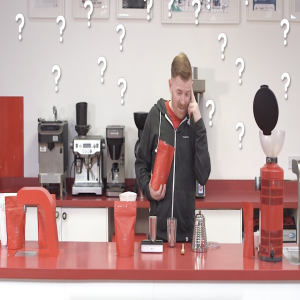
Saturday May 04, 2019
Episode 547: Brazil Carmo Estate Pulped Natural Yellow Bourbon
Saturday May 04, 2019
Saturday May 04, 2019
The Junqueira family started growing coffee on the highlands of southern Minas Gerais 150 years ago. The current owner is Tulio Junquiera. He's from the fifth generation of the family, and he's combined tradition with innovation to make Carmo Estate a sustainable farm dedicated to the production of specialty coffees. Tulio is also a former president of the Brazil Specialty Coffee Association (BSCA).
Carmo Estate’s mission is to produce exceptional coffees while providing its employees with a good quality of life and respecting the environment. The farm is located near the town of Heliodora in the southern state of Minas Gerais, which is a stunning region with mountainous terrain, mineral water springs, and ideal conditions to grow specialty coffees.
Carmo Estate has 220 hectares (545 acres) of land dedicated to the coffee varieties Mundo Novo, Catuaí, Catucaí, Bourbon, Acaiá and Icatú. The owners’ personal attention, the agronomists’ specialist supervision, and the fertile soil contribute to an average yield of 40 bags per hectare. That's more than twice the national average. Coffees from Carmo Estate are grown at altitudes ranging from 950 to 1,200 metres above sea level (3,100 to 3,900 feet).
The milling facilities at Carmo Estate were developed specially for the production of high-quality specialty Naturals and Pulped Naturals. The spacious drying patios are complemented by mechanical dryers, which are used when weather conditions are not favourable. The farm stores all of its coffee in wooden silos and has its own warehouse.
Carmo Estate is committed to the wellbeing of its employees and partners. Healthcare, on-site schooling for children, programmes to encourage workers to build their own housing, adult education projects, and the importance of environmental preservation are all hallmarks of the farm. Carmo Estate also runs an innovative profit-sharing programme, in which employees are invited to become partners in Carmo Estate and thus become entitled to a share of the profits earned from the sale of its coffee.
In the cup this reminds me of a Cadbury's Caramel. Sweet milk chocolate and caramel are front and centre. It has a silky texture, and there's a shoulder of hazelnut too.
- Country: Brazil
- Region: Minas Gerais
- City: Heliodora
- Farm: Carmo Estate
- Altitude: 950–1,200 m.a.s.l.
- Varietal: Yellow Bourbon
- Processing: Pulped Natural
- Owner: Túlio Henrique Rennó Junqueira
CUPPING NOTES
Cadbury's Caramel, milk chocolate, caramel, hazelnut.
Clean cup: (1–8): 6
Sweetness: (1–8): 7
Acidity: (1–8): 6
Mouthfeel: (1–8): 7
Flavour: (1–8): 6
Aftertaste: (1–8): 6
Balance: (1–8): 7
Overall: (1–8): 6
Correction: (+36): +36
Total (max. 100): 87
Roast Information
Medium – through first and slow it down a little, but don't let this get into second crack.

Saturday Apr 27, 2019
Episode 546: Ecuador Perla Chiquita AAA Washed Bourbon
Saturday Apr 27, 2019
Saturday Apr 27, 2019
In 1998, Fabian Lomas used to work in Quito for a company that bought and sold coffee. During his time working for this company, he was able to learn a lot about coffee as well as production and processing methods. Fast forward 10 years to 2008 and Fabian decided to take a big risk and rent a piece of land to produce his own coffee with the eventual goal of making enough money to buy his own land for himself.
From the very beginning, Fabian was familiar with speciality coffee and he wanted to start his farm off on the right foot, taking lots of care of the processes carried out on the farm to produce great tasting coffee. Currently, Fabian is trying to involve his two children, Willy and Lizeth in the operations of the farm. Every time someone visits, Fabian encourages his children to show the guests around as he wants them to take over the running of the business one day.
Willy graduated from high school in 2016 and since then, has been working with his father, learning more about coffee production, and taking care of the agricultural management of the coffee trees. For instance, Willy and Fabian are in charge of weed management, fertilization, and harvesting. Lizeth not only takes care of the drying and hand-sorting of coffee, but she also owns a garden centre.
Fabian’s family have passed through hard economic moments in their lives, which has led to lack of fertilization which in turn resulted in diseases affecting the harvest. However, now with the help of our exporting partners Caravela, they have been able to improve their economic situation, build a drying station, and their next plan is to finally buy the land to have their own farm.
In the cup this reminds me of Mirabelle plum and apricots up front, sweet and juicy, before it glides into chocolate and toffee on the finish. Give it a moment and the aftertaste changes again into biscuit.
- Country: Ecuador
- Parroquia: Pichincha
- Cantón: Nanagal
- Farm: Perla Chiquita
- Producer: Luis Fabián Lomas
- Altitude: 1,300 m.a.s.l.
- Total farm size: 5 Hectares
- Coffee producing area: 1.5 Hectares
- Varietal: Bourbon
- Processing method: Fully washed and fermented without water
- Fermentation time: 14 hours
- Drying method: Covered patios
- Drying time: 7-15 days
CUPPING NOTES
Mirabelle plum, apricot, chocolate, toffee, biscuit.
Clean cup: (1–8): 6
Sweetness: (1–8): 7
Acidity: (1–8): 7
Mouthfeel: (1–8): 6
Flavour: (1–8): 6
Aftertaste: (1–8): 6
Balance: (1–8): 7
Overall: (1–8): 6
Correction:(+36): +36
Total (max. 100): 87
Roasting Information
Medium dark - all the way through first, nice and steady between cracks, first pops of second on the drop.

Saturday Apr 20, 2019
Episode 545: Brazil Fazenda Inglaterra Natural Canario
Saturday Apr 20, 2019
Saturday Apr 20, 2019
Fazenda Inglaterra is a farm we've been buying from for over ten years, and it's one that I am very proud to be working with and linked with. The owner is my very good friend, Stephen Hurst.
To tell the story of Inglaterra, I'll hand this over to Stephen of the Hurst variety to tell you how he came to own 'Inglaterra':
“Maybe it had always been an idea in the back of my mind – so a couple of years ago when some friends in Brazil mentioned that a small coffee farm was for sale, I had a look.
The farm's name (Fazenda Toca Da Onca) means 'hiding place of a small wildcat'. The locals now call the farm 'Inglaterra'. The previous owners had abandoned Toca Da Onca/Inglaterra. So we had to start again, almost from scratch. Some surviving coffee trees were pruned right back and the coffee that you are now drinking is that re-growth from the original old trees.
For the coffee people, the varietals are Icatu, Acaia and Catucai. In future I expect coffee cherry varietals to become as well known as wine grape varietals, and to a much wider audience. The farm is located near the lovely spa town of Poços De Caldas in the coffee-growing heartlands of Brazil’s Minas Gerais state. The farm's elevation is 950–1300 metres, and it has rich soil. It's on the edge of an ancient caldera/super volcano, whose outline can be seen on satellite images. 50% of the farm is virgin Mata Atlantica forest and as long as I own it, it will stay that way. I am replanting some areas with the help of my local friends Gabriel and Cristiano, without whose assistance this project would never have started."
Back to Stephen of the Leighton variety!
After Stephen bought the farm there was one varietal he decided to add to the plant stock that wasn't already there, and that varietal was Canario. It's one of those varietals you would never plant if you had to survive on coffee for your living – pests love it, its yield is really low and the slightest change in temperature will result in frost burn; a point proved a few years back when a cold snap experienced in Poços de Caldas left over 25% of this crop damaged.
So why grow it then? Well, it produces some of the most delicious coffee you can imagine. Also, it's something that Stephen had always wanted to ask producers to try but was too afraid to ask, so he just went ahead and did it himself!
In the cup this is dried apricot mashed up with delicate peach. There's a malty sweetness in there too, which ends on a buttery finish and just a little nudge of hazelnut.
- Country: Brazil
- Region: Minas Gerais
- City: Poços de Caldas
- Farm: Fazenda Inglaterra
- Owner: Stephen Hurst
- Farm size: 10 hectares
- Coffee growing area: 5 hectares
- Altitude: 1,200 m.a.s.l.
- Varietal: Canario
- Processing system: Natural
CUPPING NOTES
Dried apricot, peach, malty, buttery, hazelnut.
Clean cup: (1–8): 7
Sweetness: (1–8): 7
Acidity: (1–8): 6
Mouthfeel: (1–8): 7
Flavour: (1–8): 6
Aftertaste: (1–8): 6
Balance: (1–8): 6
Overall: (1–8): 7
Correction:(+36): +36
Total (max. 100): 88
Roast Information
Medium/medium dark – nice and steady through the crack and extend the development time, but drop before second gets going.

Saturday Apr 13, 2019
Episode 544: Costa Rica Finca Licho Yellow Honey Villa Sarchi
Saturday Apr 13, 2019
Saturday Apr 13, 2019
Licho is a coffee that I feel shows our development as a roaster over the years. First we bought this coffee in the Cup of Excellence program (a great way to meet a grower), then we bought it from an import broker; they helped us bring in this coffee because we are a small coffee buyer. Then we bought directly from them. Then, three years ago, I went out to the farm and did the deal on the farm with the brothers. I love the fact that 2 years ago I walked onto the farm after cupping a particular lot in the exporter's office, asked how much they wanted, and there was a short conference. They came back and told me, then we shook hands. Then we got back into the 4x4 and drove away. That year we agreed a European-exclusive deal with them for this coffee, and this year we continue the close work we have been doing with them.
Grown by the Aguilera brothers in the province of Naranjo, in the volcanic Northern Cordiles corridor of the Western Valley, this coffee is cultivated at an altitude of 1,500 metres above sea level. Most of their coffee is of the Villa Sarchi variety, native to the area and excellent in the cup. Villa Sarchi is a Bourbon mutation (similar to Caturra and Pacas) found originally in Naranjo, West Valley. It is a dwarf variety with short internodes and usually higher-yielding production.
This coffee is honey processed, which is like the pulped natural method, so the fruit is removed from the seed of the coffee bush and left to dry. The main difference is that there is no water involved when the cherry is removed, so mucilage sticks to the bean. This can be dangerous, but it's necessary in these parts of Costa Rica where water is limited: in this area of Naranjo water is a precious commodity, so this method suits the location very well.
The coffee ends up clustering whilst drying because there is so much mucilage. So the coffee either needs to be turned regularly to stop this happening, or it has to be broken up. Over-fermentation can happen at this stage and you can end up with a not-so-good cup, but the Aguilera brothers are well-versed in this method and are some of the most skilled in Costa Rica.
Want to know a little more about honey processing? Here's a video you might enjoy!
The Aguileras are 12 brothers and sisters, all of whom are involved in coffee as inherited from their parents. The brothers work the mill and farms themselves with basically no hired labor, other than pickers during the harvest. With the help of the third generation, they work the mill and drying patios, prune the coffee fields, fertilize, etc, year-round. The Aguilera Bros understand quality at the farm and mill level, and this is why we are excited about working with them.
Coffee has been cultivated in Costa Rica since 1779. Currently, the regions producing the best quality are Tarrazu, West Valley, and Central Valley. Coffee production has been threatened the past decade due to a real-estate boom converting coffee-lands into prime development properties. San Jose, the capital, is right in the heart of Central Valley, where you will find private houses next to coffee farms. The value of these farms have now skyrocketed.
In the cup you'll get satsumas and honeydew melon, all generously drizzled in honey. This one's all about the sweetness, with hints of brown sugar and cocoa powder joining that silky sweet honey on the finish.
- Country: Costa Rica
- Region: Western Valley
- Province: Alajuela
- Nearest city: Naranjo de Alajuela
- Farm: Finca Licho
- Producers: Aguilera Family
- Farm Size: 28.00 Hectares
- Coffee growing area: 9.10 Hectares
- Altitude: 1,500 m.a.s.l.
- Varietal: 70% Villa Sarchí & 30% Caturra
- Processing System: Yellow Honey
CUPPING NOTES
Satsuma, honeydew melon, honey, brown sugar, cocoa powder.
Clean Cup: (1-8): 6.5
Sweetness: (1-8): 7.5
Acidity: (1-8): 6.5
Mouthfeel: (1-8): 7
Flavour: (1-8): 6.5
Aftertaste: (1-8): 6
Balance: (1-8): 6.5
Overall: (1-8): 6.5
Correction:(+36): +36
Total: (max 100): 89
Roasting Information
Medium - get it through first crack and develop the sweetness, but do not let it hit second.
"Quick Look" Guide
Satsuma, honeydew melon, honey, brown sugar, cocoa powder.
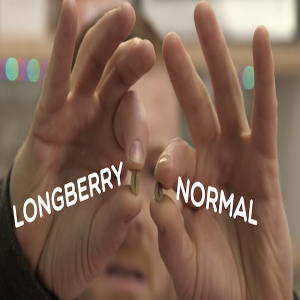
Saturday Apr 06, 2019
Episode 543: Bolivia Finca El Fuerte Washed Longberry
Saturday Apr 06, 2019
Saturday Apr 06, 2019
Finca El Fuerte was named in honor of the 'Fort of Samaipata', which is a unique ruin in Bolivia. El Fuerte de Samaipata (Fort Samaipata), also known simply as 'El Fuerte', is a pre-Columbian archaeological site, unique in that it represents the legacies of Inca, Spanish and Chanè cultures and is one of Samaipata's main attractions. Situated in the eastern foothills of the Bolivian Andes, in the Santa Cruz department of Florida province, the archaeological site is also a UNESCO World Heritage site.
El Fuerte de Samaipata is not actually a military fortification, but it is generally considered a pre-Columbian religious site, built by the Chané people, who were a pre-Inca culture of Arawak origin. There are also ruins of an Inca city built near the temple; the city was built during the Inca expansion to the southeast. Both Incas and Chanés suffered several raids from Guarani warriors, who invaded the region from time to time. Eventually, the Guarani warriors conquered the plains and valleys of Santa Cruz, and destroyed Samaipata. The Guaranis dominated the region well into the Spanish colonial period.
The Spaniards also built a settlement near the temple, and there are remains of buildings of typical Andalusi Arabic architecture. The Spaniards abandoned the settlement and moved to the nearby valley, where the town of Samaipata is currently located. The archaeological site at El Fuerte is unique, and it encompasses buildings of three different cultures: Chanés, Incas and Spaniards.
El Fuerte was a first experiment in developing coffee in a region with excellent characteristics for producing amazing quality coffee (good soil conditions and high altitude), but traditionally little coffee production and no specialty coffee. After consulting with a specialised agronomist, the region of Agua Rica at the edge of the Amboró National Park, some 20km east of Samaipata, was chosen as the ideal location.
Initially several different varietals were tried, including Red Bourbon, and Yellow and Red Caturra - although nowadays Agricafe (who run the farm) have ventured into growing other varietals. Caturra and Typica (both are traditionally grown in Bolivia) are commonly seen, but alongside other slightly rarer varietals like Java and Geisha. Although there is little need for trees for shade as the altitude keeps the temperature down, trees were planted to protect the coffee trees from the strong winds that are common in the region.
Deciding to go ahead and plant coffee at El Fuerte was something of a risk, but it's one that undoubtedly has paid off. The location has proved to be strategic and the weather is ideal, so much so that a second wet mill will soon be established at the site - and once it is, all coffee produced in the Samaipata farms will be processed at El Fuerte.
On my last visit to the farm I climbed up to the higher altitudes where this Java crop is grown and caught sight of some trees I hadn't seen on the farm before, the Geisha trees! Oooooh - you know I'll do all I can to get my hands on some when they're first harvested!
In the cup you're going to get an orange creme chocolate. The sweet citrus dominates, but with that hint of chocolate mixed in. That orange creme is really highlighted by the heavy, silky body. That's paired with a soft floral aftertaste, which makes for a super interesting and complex cup.
- Country: Bolivia
- Province: Florida
- Department: Santa Cruz
- Farm: Finca El Fuerte
- Altitude: 1,550–1,700 m.a.s.l.
- Variety: Java (Longberry)
- Process: Washed
- Fermentation: Wet fermentation
- Drying: Stationary Dryer (70 hrs/40º temp)
CUPPING NOTES
Orange creme, chocolate, floral.
Clean cup (1–8): 7
Sweetness (1–8): 6
Acidity (1–8): 7
Mouthfeel (1–8): 8
Flavour (1–8): 6.5
Aftertaste (1–8): 6.5
Balance (1–8): 6.5
Overall (1–8): 6.5
Correction (+36): +36
Total: (max. 100): 90
Roast Information
Medium - through first then take the heat out to let it develop, but don't let this reach second.
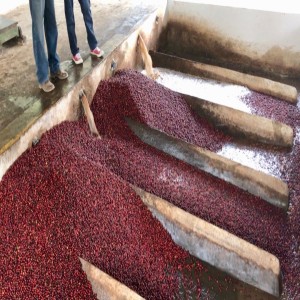
Saturday Mar 30, 2019
Saturday Mar 30, 2019
Raul Perez has grown up around coffee. He comes from a fifth-generation coffee-farming family on his father's side, and a third generation family on his mother's side. Coffee has always been part of his life.
Finca La Soledad has been a Pérez family coffee farm since 1895. The farm is located in Acatenango, near to the Acatenango volcano. It has a great microclimate at an altitude of 1,650 metres above sea level. 🌋
The Pérez family have invested heavily in their mill, rebuilding it with the environment in mind. They have a clever system through which they are able to recycle the water they use for processing many times. ♻️
Raul and his dad Henio work together on the farm to raise quality standards every day. They have built a cupping and roasting lab on the farm, and Raul has been roasting and cupping samples of days' pickings so they can learn at farm level what they can do to improve the cup.
All our lots from La Soledad this year are dry fermented Washed coffees. This means that after the cherries have been picked and depulped, they are stored in tanks where fermentation by yeast and lactic acid bacteria breaks down the fruit mucilage so that it falls away from the bean in the centre. This fermentation process isn’t just a practical way of getting to the coffee beans, though; it also plays a key part in developing the flavours that make a great coffee something special. It’s a super interesting (and complex!) part of the bean's journey from the plant to us, and one with which the Perez family are exploring and experimenting in ways we haven’t seen anywhere else in coffee.
This is Bella Vistina - one of two Catuai micro lots (the other is Amaton) we have from Finca La Soledad this year. Each has a subtly different fermentation process, but they're otherwise very similar.
This lot has been fermented for 90 hours. The typical time for a dry fermentation would be 35–40 hours at 20°C to 26°C, so this has had about 50-55 hours longer than a typical dry fermentation on the farm! If a lot ferments for too long, it usually develops unpleasant flavours but fear not the folks at La Soledad wouldn't let that happen and definitely didn't here.
This is possible because the team at La Soledad have got a clever trick to control the temperature. By running copper pipes around the tank and pumping cold water through those pipes, they can cool the fermenting beans down. This slows down the rate of fermentation but also changes the kind of flavour compounds the yeast and bacteria produce, allowing the fermentation to progress further without developing unpleasant flavours.
That’s all a bit clever, but what matters is how it tastes, right? Well, it really delivers on the sweet and clean flavours from that long, slow fermentation.
In the cup expect a Tart Tatin. Sharp green apple acidity balances sweet caramel and pastry in a delicious dessert like hit. As it finishes, you get a shoulder of dark chocolate and then a super interesting aftertaste which reminds me of redcurrant.
- Country: Guatemala
- Region: Acatenango
- Producers: Raul Pérez and family
- Farm: Finca La Soledad
- Altitude: 1,650 m.a.s.l.
- Varietals grown: Caturra, Catuai, Bourbon, Typica, and Pache
- Fermentation method: Cold
- Fermentation time: 90 hours
- Processing method: Washed
CUPPING NOTES
Tart Tatin, green apple, caramel, pastry, dark chocolate, redcurrant.
Clean cup (1–8): 6
Sweetness (1–8): 6
Acidity (1–8): 7
Mouthfeel (1–8): 6
Flavour (1–8): 7
Aftertaste (1–8): 7
Balance (1–8): 6
Overall (1–8): 6
Correction (+36): +36
Total: (max. 100): 87
Roast Information
Medium dark - straight through first crack and slow it down a little before dropping just as you reach second crack.

Saturday Mar 23, 2019
Episode 541: Brazil Fazenda Cachoeira da Grama Natural Yellow Bourbon
Saturday Mar 23, 2019
Saturday Mar 23, 2019
This farm and its coffee sparked a massive change in what I thought I knew about coffee. I remember the first time I ever cupped this coffee: time stood still as the cup opened my mind to what great coffee is and can be. Gabriel de Carvalho Dias, the farmer, continues to produce great coffee year on year, and this coffee still holds a very special place in my heart.
Gabriel is one of Brazil’s leading agronomists. His family owns several farms, all of which border one another. Fazenda Cachoeira da Grama is 417 hectares in size – that’s 4 square kilometres! That sounds huge, but it’s not uncommon for farms to be more than 1,000 hectares! Because of the mountainous terrain, however, only 64 hectares are planted with coffee, and it's all picked and maintained by hand. The mill is located close to the spa town of Poços de Caldas, which is 45 minutes away from the farm.
Fazenda Cachoeira da Grama has been in the Carvalho Dias family since 1890 and is located in São Paolo state, just three miles from the border with Minas Gerais state. It enjoys the typical characteristics of the mountainous Mogiana and Sul de Minas regions, and it's located at an altitude of 1,100–1,250 metres above sea level.
Their farm also has a school, a club and a full-sized soccer field for the employees and workers, and 47 houses – all with modern facilities. As well as providing support to the workers, the family have also invested in the farm's processing facilities. This has allowed them to produce one of the most consistent and delicious coffees. They grow mostly Yellow Bourbon, but also Canario and Mundo Novo. It's well-established plant stock, with some of the Bourbon plants going back over 100 years.
They’ve also invested in trying new things, including planting some new varietals and trialing new fermentation experiments with the involvement of experts from the University of Lavras (UFLA) in Minas Gerais.
This coffee is processed as a Natural: with the ripe fruit dried in the sun before the green bean is removed.
In the cup this is super sweet and creamy. Think single cream poured over nuts. It starts with hazelnut and a bit of toasted almond, but finishes on walnuts and pine nuts.
- Country: Brazil
- State: São Paolo
- Municipality: São Sebastião da Grama
- Farm: Fazenda Cachoeira da Grama
- Processing: Natural
- Varietal: Yellow Bourbon
- Altitude: 1,100–1,250 m.a.s.l.
- Owner: Lidolpho de Carvalho Dias and family
CUPPING NOTES
Single cream, hazelnut, walnut, pine nut.
Clean cup: (1–8): 6
Sweetness: (1–8): 6.5
Acidity: (1–8): 6
Mouthfeel: (1–8): 7
Flavour: (1–8): 6
Aftertaste: (1–8): 6
Balance: (1–8): 7
Overall: (1–8): 6.5
Correction (+36): +36
Total (max. 100): 87
Roast Information
Medium dark – through first and slow it down a bit before dropping just on the cusp of second crack.

Saturday Mar 16, 2019
Episode 540: Colombia Finca La Chorrera Washed Caturra
Saturday Mar 16, 2019
Saturday Mar 16, 2019
Finca La Chorrera is located near to the city of Pitalito, in the south of the Huila department. It's in the valley of the Rio Grande de la Magdalena, known as 'The Valley of Laboyos', which is 180km away from Nieva, the capital of Huila. Pitalito is also the second largest city of the department of Huila, at approximately 125,000 inhabitants, and is considered one of the largest areas of coffee production in Colombia.
This farm is located on top of a mountain at 1,735 metres above sea level. It contains 70% Caturra (25,000 plants; this lot comes from them), 20% Colombia F6 (7,000 plants) and 10% Castillo (2,000 plants). The farm consists of eight hectares, six of which are planted with coffee. The other two hectares house the mill and inaccessible (but gorgeous!) mountainous areas. The family house, which is also used for drying, is at the bottom of the hill at around 1,400 metres above sea level.
I took some awesome pictures on my trip in 2013, so take a look here, and I took some more on my trip in 2014 – find them here!
The farm is owned and run by the Claros family: Pedro, his wife Nelcy and their six children (Alberio, Edilson, Sandra, Hermes, Diana and Monica). It's a real family business with everyone pitching into the farm to make it work.
The farm's drying patio is one of the most amazing things I’ve seen. It's a greenhouse built on top of the house so that the coffee can be turned regularly, but also to make sure no one steals it. The latter was not so much of a problem when coffee prices were lower, but it's a genuine problem when they're higher. Of course, Pedro doesn't have to worry about market prices; he always gets a premium because he consistently produces amazing quality coffee, but black market coffee just goes to the highest market bidder.
In the cup this is blackcurrant mashed up with tropical fruit. There's a floral edge to it too, before it finishes on lychee, but leave a delicious aftertaste of fudge.
- Country: Colombia
- Department: Huila
- Nearest town: Pitalito
- Farm: Finca La Chorrera
- Owners: Claros family
- Altitude: 1,735 m.a.s.l.
- Farm size: 8 hectares
- Coffee growing area: 6 hectares
- Varietal: Caturra
- Processing: Washed
CUPPING NOTES
Blackcurrant, tropical fruit, floral, lychee, fudge.
Clean cup: (1–8): 7
Sweetness: (1–8): 6
Acidity: (1–8): 7
Mouthfeel: (1–8): 6
Flavour: (1–8): 8
Aftertaste: (1–8): 7
Balance: (1–8): 6
Overall: (1–8): 7
Correction: (+36): +36
Total: (max. 100): 90
Roast Information
Medium dark - through first and push it right to the first pops of 2nd, but don't let it get into full second crack.

Saturday Mar 09, 2019
Episode 539: Bolivia Vincent Paye Washed Caturra
Saturday Mar 09, 2019
Saturday Mar 09, 2019
A couple of years back we had a lot that was produced by various smallholder farmers from the small town of Copacabana, which lies about 180 kilometres from La Paz in the heart of the Caranavi coffee-producing region. Then in 2016 things changed a little and it then came from just one producer in the area, whose name is Vincent Paye. That year I described him as a beacon of hope in a tough growing region, and that beacon has continued to shine brightly.
Caranavi is a lush and fertile region with steep slopes and valleys providing excellent conditions for growing high quality coffee, while also supporting a diverse range of native flora and fauna. It has rich volcanic soils and regular rainfall - coffee growing heaven.
The colony of Copacabana has a collection of small farms that are each around five hectares in size (although Vincent has ten hectares). The farms range over an altitude of 1,300 to 1,700 metres above sea level, and they benefit from an average annual temperature between 15 and 26°C. This lot comes from Vincent's farm which is very similar to neighbouring farms and is at an altitude of around 1,550 m.a.s.l. These traditional farms use no chemicals or pesticides and are certified organic, although we do not currently hold an organic certification ourselves.
The main harvest runs from May to September, peaking around July and August. The cherries are handpicked when fully ripe, and they're then delivered to the central mill, called Buena Vista, where they are fully washed.
Bolivia is a challenge and is going through some tough times: dwindling crops, ageing plants, lack of varietal diversity and ageing producers with children who have little to no interest in carrying on the family business. But then there are people like Vincent who are doing wonderful work to buck that trend. He's been planting new stock, working hard with his family, and increasing his yield – and also the quality of his coffee.
In the cup this is super creamy - both in flavour and texture. That cream is joined by hints of walnut and red apple, before soft peach drifts in on the aftertaste. All of this makes for a really well balanced coffee that keeps drawing you back in for another sip.
- Country: Bolivia
- Region: Yungas
- Municipality: Caranavi
- Town: Copacabana
- Farm: Vincent Paye
- Altitude: 1,550 m.a.s.l.
- Owner: Vincent Paye
- Varietal: Red & Yellow Caturra
- Processing: Washed
CUPPING NOTES
Cream, walnut, red apple, peach.
Clean cup: (1–8): 6
Sweetness: (1–8): 6
Acidity: (1–8): 6
Mouthfeel: (1–8): 7
Flavour: (1–8): 7
Aftertaste: (1–8): 6
Balance: (1–8): 8
Overall: (1–8): 7
Correction: (+36): +36
Total: (max. 100): 89
Roast Information
Medium dark - through first, let it develop nicely and look for the first pops of second on the drop.

Saturday Mar 02, 2019
Episode 538: Brazil Fazenda Cachoeira da Grama Natural Canario
Saturday Mar 02, 2019
Saturday Mar 02, 2019
This farm and its coffee sparked a massive change in what I thought I knew about coffee. I remember the first time I ever cupped this coffee: time stood still as the cup opened my mind to what great coffee is and can be. Gabriel de Carvalho Dias, the farmer, continues to produce great coffee year on year, and this coffee still holds a very special place in my heart.
Gabriel is one of Brazil’s leading agronomists. His family owns several farms, all of which border one another. Fazenda Cachoeira da Grama is 417 hectares in size – that’s 4 square kilometres! That sounds huge, but it’s not uncommon for farms to be more than 1,000 hectares! Because of the mountainous terrain, however, only 64 hectares are planted with coffee, and it's all picked and maintained by hand. The mill is located close to the spa town of Poços de Caldas, which is 45 minutes away from the farm.
Fazenda Cachoeira da Grama has been in the Carvalho Dias family since 1890 and is located in São Paolo state, just three miles from the border with Minas Gerais state. It enjoys the typical characteristics of the mountainous Mogiana and Sul de Minas regions, and it's located at an altitude of 1,100–1,250 metres above sea level.
Their farm also has a school, a club and a full-sized soccer field for the employees and workers, and 47 houses – all with modern facilities. As well as providing support to the workers, the family have also invested in the farm's processing facilities. This has allowed them to produce one of the most consistent and delicious coffees. They grow mostly Yellow Bourbon, but also Canario and Mundo Novo. It's well-established plant stock, with some of the Bourbon plants going back over 100 years.
They’ve also invested in trying new things, including planting some new varietals and trialing new fermentation experiments with the involvement of experts from the University of Lavras (UFLA) in Minas Gerais.
This coffee is processed as a Natural: with the ripe fruit dried in the sun before the green bean is removed.
This comes from the rare Canario varietal, which is a Bourbon mutation that originated in Brazil. You can find out more about it here, but what you will notice in the cup is that it adds complexity and acidity compared to Bourbon.
In the cup expect dark chocolate drops and walnut. There's a subtle yellow plum sweetness mixed in as well, which changes into a raisin flavour on the finish.
- Country: Brazil
- State: São Paulo
- Municipality: São Sebastião da Grama
- Farm: Fazenda Cachoeira da Grama
- Processing: Natural
- Varietal: Canario
- Altitude: 1,100–1,250 m.a.s.l.
- Owner: Lidolpho de Carvalho Dias and family
CUPPING NOTES
Dark chocolate, walnut, yellow plum, raisin.
Clean cup: (1–8): 6
Sweetness: (1–8): 6.5
Acidity: (1–8): 6
Mouthfeel: (1–8): 6.5
Flavour: (1–8): 7.5
Aftertaste: (1–8): 6
Balance: (1–8): 7
Overall: (1–8): 6.5
Correction (+36): +36
Total (max. 100): 88
Roast Information
Medium dark – through first and develop it through the gap, but drop just as you approach second to emphasise the body but keep the subtle fruit tones.

Saturday Feb 23, 2019
Episode 537: El Salvador Finca Las Brumas Wild Forest Project Washed SL28
Saturday Feb 23, 2019
Saturday Feb 23, 2019
This is the 2018 crop of the coffee Dale Harris used to win the 2017 World Barista Championship in Seoul, South Korea.
Juan Jose Ernesto 'Neto' Menéndez Argüello belongs to the fourth generation of coffee farmers in his family. His father died in 1995. After completing his studies at university, Neto had the opportunity to start working in the coffee industry at J. Hill & Cia, in 2000. He left J. Hill & Cia after five years, and began his second coffee experience at JASAL.
Both companies gave him the opportunity to meet 'Grano de Oro' from another perspective, allowing him to learn the art and passion of cupping. He says those are very important in his life, and that they give him the opportunity to apply his coffee knowledge and experience that he's gained through the years.
During his time in the coffee world, he has participated in various events like the Cup of Excellence (National Jury from 2003 to 2011), Q Auction, Q Grader, and the Star Cupper program organised by SCAA and CQI.
Las Brumas is located between 45 to 60 minutes from Santa Ana city. It has a cultivated area of 60 hectares' worth of coffee yield, all of which is at an altitude ranging from 1,450 to 1,700 m.a.s.l. It produces around 600 bags of coffee each year, and has an area of 35 hectares of virgin mountain at an altitude from 1,700 to 2,000 m.a.s.l.
The farm is located in the Sonsonate department near the area known as San Blas. Las Brumas has very rich volcanic soil, deep and very fertile, which has been generated by different Ilamatepec and Izalco volcanic eruptions throughout its history.
One of the most important elements is the micro climate. It's very misty at the farm for most of the year, and that's why Neto decided to name the farm Finca Las Brumas. This amazing micro climate is generated when the warm air from the Pacific ocean collides with the high peaks of the Volcanoes Park (which comprises of the Santa Ana, Cerro Verde and Izalco volcanoes).
Due to its location between these three famous volcanoes in El Salvador, this unique micro climate reduces the amount of daylight that the coffee trees receive. This helps the coffee trees have a very slow photosynthesis, improving the maturation process, and this in turn improves some attributes that are closely related to maturity, like the aroma, sweetness, acidity and flavour.
This coffee was produced as part of the Las Brumas Wild Coffee Project where Neto is using previously unfarmed forested land for coffee production, but doing so in a thoughtful and careful way so as not to remove any of the flora and fauna, and so that the space remains – primarily – a forest. Instead of clearing the land to give him a blank canvas for a new coffee growing area he's working with the forest to create a unique environment and a unique coffee.
The soil of the forested area had never been used to grow coffee in before and had benefited from years of its own natural fertilisation system due to all the forest floor goodness, and the constant supply of twigs and leaves dropping down to continually enrich the soil.
Growing coffee in this way affected the speed of the coffee's growth (lots of shade) and took 7 years from initial planting to the first harvest, in a normal area of coffee production that would have only been 3 years but the extra cover from the forest makes everything happen at a slower speed. That slowness also applies to the maturation of the coffee cherry too, similar to growing at really high altitudes - it takes its time and does things slowly because of the conditions resulting in a 15% longer maturation than Neto sees on the rest of Las Brumas.
In the cup you’ll get a creamy sweetness up front, with hints of brown sugar. Tangerine takes over next, swinging subtly in to orange peel on the finish.
- Country: El Salvador
- Department: Sonsonate
- Nearest city: Santa Ana
- Farm: Finca Las Brumas
- Farmer: Juan Jose Ernesto 'Neto' Menéndez Argüello
- Altitude: 1,450–1,700 m.a.s.l.
- Variety: SL28
- Processing system: Washed
CUPPING NOTES
Brown sugar, tangerine, orange peel, creamy.
Clean cup: (1–8): 8
Sweetness: (1–8): 7.5
Acidity: (1–8): 6.5
Mouthfeel: (1–8): 6
Flavour: (1–8): 6.5
Aftertaste: (1–8): 6
Balance: (1–8): 6.5
Overall: (1–8): 8
Correction:(+36): +36
Total: (max. 100): 91
Roasting Information
Medium - through first and develop this a bit before dropping just as you approach second crack.
"Quick Look" Guide
Brown sugar, tangerine, orange peel, creamy.

Saturday Feb 16, 2019
Episode 536: Bolivia Finca El Fuerte Washed Red Bourbon
Saturday Feb 16, 2019
Saturday Feb 16, 2019
Finca El Fuerte was named in honor of the 'Fort of Samaipata', which is a unique ruin in Bolivia. El Fuerte de Samaipata (Fort Samaipata), also known simply as 'El Fuerte', is a pre-Columbian archaeological site, unique in that it represents the legacies of Inca, Spanish and Chanè cultures and is one of Samaipata's main attractions. Situated in the eastern foothills of the Bolivian Andes, in the Santa Cruz department of Florida province, the archaeological site is also a UNESCO World Heritage site.
El Fuerte de Samaipata is not actually a military fortification, but it is generally considered a pre-Columbian religious site, built by the Chané people, who were a pre-Inca culture of Arawak origin. There are also ruins of an Inca city built near the temple; the city was built during the Inca expansion to the southeast. Both Incas and Chanés suffered several raids from Guarani warriors, who invaded the region from time to time. Eventually, the Guarani warriors conquered the plains and valleys of Santa Cruz, and destroyed Samaipata. The Guaranis dominated the region well into the Spanish colonial period.
The Spaniards also built a settlement near the temple, and there are remains of buildings of typical Andalusi Arabic architecture. The Spaniards abandoned the settlement and moved to the nearby valley, where the town of Samaipata is currently located. The archaeological site at El Fuerte is unique, and it encompasses buildings of three different cultures: Chanés, Incas and Spaniards.
El Fuerte was a first experiment in developing coffee in a region with excellent characteristics for producing amazing quality coffee (good soil conditions and high altitude), but traditionally little coffee production and no specialty coffee. After consulting with a specialised agronomist, the region of Agua Rica at the edge of the Amboró National Park, some 20km east of Samaipata, was chosen as the ideal location.
Initially several different varietals were tried, including Red Bourbon, and Yellow and Red Caturra - although nowadays Agricafe (who run the farm) have ventured into growing other varietals. Caturra and Typica (both are traditionally grown in Bolivia) are commonly seen, but alongside other slightly rarer varietals like Java and Geisha. Although there is little need for trees for shade as the altitude keeps the temperature down, trees were planted to protect the coffee trees from the strong winds that are common in the region.
Deciding to go ahead and plant coffee at El Fuerte was something of a risk, but it's one that undoubtedly has paid off. The location has proved to be strategic and the weather is ideal, so much so that a second wet mill will soon be established at the site - and once it is, all coffee produced in the Samaipata farms will be processed at El Fuerte.
In the cup this is all about the sweet flavours. It makes me think of a part melted chocolate bar. There's a shoulder of red apple acidity, then it shifts into sweet almond on the finish, leaving a creamy aftertaste behind.
- Country: Bolivia
- Province: Florida
- Department: Santa Cruz
- Farm: Finca El Fuerte
- Altitude: 1,550–1,700 m.a.s.l.
- Variety: Red Bourbon
- Process: Washed
- Drying: Stationary Dryer (72 hours, 40º temp)
CUPPING NOTES
Melted chocolate, red apple, almond.
Clean cup (1–8): 6
Sweetness (1–8): 6.5
Acidity (1–8): 6
Mouthfeel (1–8): 7
Flavour (1–8): 6.5
Aftertaste (1–8): 6
Balance (1–8): 7
Overall (1–8): 6
Correction (+36): +36
Total: (max. 100): 87
Roast Information
Medium dark - slow it down but push it through the gap between cracks, you're looking for those very first pops of second on the drop.

Friday Feb 08, 2019
Episode 535: Burundi Kibingo Washed Bourbon
Friday Feb 08, 2019
Friday Feb 08, 2019
The Kibingo central washing station is located in the commune of Kayanza in northern Burundi. The station itself lies at 1,893 meters above sea level, and the altitude of the farms in the neighbouring hills that supply the washing station vary from 1,700 to 1,900 meters above sea level. Kibingo services 3,553 registered coffee growers, spread over 18 hills in the area.
The washing station is equipped with 10 fermentation tanks, 2 soaking tanks and a drying field with 165 drying tables and 4 pre-drying tables. Kibingo can process 750,000 kg of cherry per day.
At cherry intake, a picking team sorts the cherries on maturity. This is essential for a fine processing, resulting in fewer damaged beans. The cherry skins are mechanically removed during pulping. Next, the sticky parchment will dry ferment for 12 hours. When fermentation is complete, the parchment goes down the washing and grading channel. Finally, the top quality coffee soaks for an additional 24 hours to remove any remaining mucilage before going to the pre-drying tables. Here, the second team of pickers checks the wet parchment to take out defect beans. After a couple of hours, the parchment is moved to the drying tables. Depending on the weather conditions, it will reach 12% moisture content in about two weeks.
Kibingo CWS has 3,553 registered farmer members, spread over 18 collines or hills in Kayanza province. All producers registered at the washing station are organized in groups of 30 people, headed by a farm leader. This leader acts as a spokesman to facilitate communication and organization with the washing station.
In Burundi, wet mills can reach farmers in a range of 3km. If the washing station is located too far away, producers will sell to middlemen, often at a disadvantage. To prevent this, Kibingo and other washing stations have collection centres - these centres allow them to reach farmers at up to 9 kilometres distance from the wet mill. This is a huge benefit for a producer who then doesn’t have to travel far with a heavy load of cherries. At the same time, shorter distances help to preserve the quality of the coffee too.
At the washing station, farmers can obtain organic fertilizer from reconverted coffee pulp. To promote farm renovation, producers can get low-cost, subsidized coffee seedlings at the washing station. Each station has its own nursery for this purpose.
Kayanza has one of the best coffee growing reputations in Burundi. Coffee farms lie in the highlands, where soils are rich and volcanic. But optimal growing conditions alone aren’t enough to produce a high-quality coffee. To achieve the best coffee, a skilled and dedicated washing station manager is essential. They oversee the implementation of good economic practice and farmer education and collaborate with the producers to ensure they have access to the necessary tools. They also help farmers determine and implement the practices best suited to the specific growing conditions of their plantations.
Next to improving quality and productivity, the company that manage the washing station, Greenco, strives to improve socio-economic and environmental conditions around the washing stations. All of their washing stations have UTZ and 4C certification. One of their focus points is building an efficient supply chain around the CWS. Greenco is buying 93% of its cherries directly from farmers via collection centres. This way, they improve farm-gate price to the producers.
Another socio-economic challenge Greenco addresses is Burundi’s high rate of youth unemployment. The national youth unemployment rate is almost 50%. At Greenco, young graduates receive a decent salary and benefits (house, motorbike, healthcare) as well as real career prospects.
Adding to the training on farming practices, Greenco organises training for farmer groups on various social aspects. Coffee families learn about gender equality, financial planning, family planning, breastfeeding, and many other things too.
On an environmental side, Greenco has equipped all washing stations with water treatment facilities and solar panels and batteries. The solar panels provide energy for computers, lighting and smartphones.
In the cup this is super refreshing and clean, think Gala melon and crisp white grape. It finishes with a hit of cocoa powder and a shoulder of orange zest.
- Country: Burundi
- Province: Kayanza
- Commune: Kayanza
- Nearest town: Kinga
- Washing station: Kibingo
- Washing station altitude: 1,839 m.a.s.l.
- Coffee growing altitude: 1,600-1,900 m.a.s.l.
- Producers: 3,553
- Varietal: Bourbon
- Processing method: Washed
CUPPING NOTES
Gala melon, white grape, cocoa powder, orange zest.
Clean cup: (1–8): 6.5
Sweetness: (1–8): 6
Acidity: (1–8): 6.5
Mouthfeel: (1–8): 6
Flavour: (1–8): 7
Aftertaste: (1–8): 6
Balance: (1–8): 6
Overall: (1–8): 7
Correction: (+36): +36
Total: (max. 100): 87
Roast Information
Medium - through first and through the gap, but drop it just before second crack begins.

Saturday Feb 02, 2019
Episode 534: Bolivia Bebeto Mamani Washed Caturra
Saturday Feb 02, 2019
Saturday Feb 02, 2019
The name of this coffee producer may sound a little familiar: Bebeto ('Beto' for short) is the son of the legend that is Teodocio Mamani. Teodocio owns Finca Canton Uyunense, which is a farm we have worked with since 2012.
His farm is located in 18 de Mayo, which is a municipality of Caranavi (and part of canton Uyunense). Lots of farms can be called a variation on these names because the land traditionally tends not to have a name.
This year is the fourth year that Bebeto has grown coffee under his own guardianship, and it's the third year that he has processed it himself too. Just like previous years, and as you'd expect from a Mamani, the results are delicious.
Although Bebeto grows Typica, Caturra and Catuai on his farm, this is a lot of only Caturra. Bebeto used a depulper to remove the cherry, then left the coffee to go through a dry fermentation process for 16–18 hours, and then ran it through the scrubber section of the pulper to remove the final remains of the mucilage. Bebeto then transferred the coffee to raised African beds, where it dried in around 7–9 days.
The picking method Bebeto uses is called 'Ayne'. It's the same method his dad uses on Canton Uyunense. This method involves selective picking (not stripping the tree, like their neighbours do), and it demands much more labour and incurs much higher costs. But because of this method, Bebeto gets more coffee he can sell as specialty, and the cup profile is improving year after year.
In the cup I want you to think lime curd. Not tart, but sweet and creamy, and that lime flavour runs though. As it finishes, there's a medley of fruit flavours that creep in: pineapple cubes and raspberry, alongside tropical hints. With all that fruit and cream, there's no surprise this reminds me of trifle! Yum!
- Country: Bolivia
- Department: La Paz
- Region: Yungas
- Province: Caranavi
- Municipality: 18 de Mayo
- Producer: Bebeto Mamani
- Varietals grown: Typica, Caturra, and Catuai
- Altitude: 1,600–1,750 m.a.s.l.
- Processing method: Washed
- Fermentation: 16–18 hours
- Drying method: Raised beds
- Other crops grown: citrus, papaya, banana, wild forest
CUPPING NOTES
Lime curd, pineapple cubes, raspberry, trifle.
Clean cup: (1–8): 6.5
Sweetness: (1–8): 7
Acidity: (1–8): 7
Mouthfeel: (1–8): 6.5
Flavour: (1–8): 6.5
Aftertaste: (1–8): 6
Balance: (1–8): 6.5
Overall: (1–8): 7
Correction: (+36): +36
Total (max. 100): 89
Roast Information
Medium to medium dark – through first and make sure it's well developed, but anywhere from the end of the gap into the early start of second crack will give tasty results.

Saturday Jan 26, 2019
Saturday Jan 26, 2019
Raul Perez has grown up around coffee, he comes from a fifth generation coffee farming family on his father's side, and a third generation family on his mother's side. Coffee has always been part of his life.
Finca La Soledad has been a Pérez family coffee farm since 1895. The farm is located in Acatenango, near to the Acatenango volcano. It has a great microclimate at an altitude of 1,650 metres above sea level 🌋
The Pérez family have invested heavily in their mill, rebuilding it with the environment in mind. They have a clever system through which they are able to recycle the water they use for processing many times ♻️ Raul and his dad Henio work together on the farm to raise quality standards every day, they have built a cupping and roasting lab on the farm and Raul has been roasting and cupping samples of days' pickings so they can learn at farm level what they can do to improve the cup.
All our lots from La Soledad this year are Dry Fermented Washed coffees - this means that after the cherries have been picked and depulped they are stored in tanks where fermentation by yeast and lactic acid bacteria breaks down the fruit mucilage, so that it falls away from the bean in the centre. This fermentation process isn’t just a practical way of getting to the coffee beans though - it also plays a key part in developing the flavours that make a great coffee something special. It’s a super interesting (and complex!) part of the beans journey from the plant to us and and one which the Perez family are exploring and experimenting with in ways we haven’t seen anywhere else in coffee.
This is Amaton - one of two Catuai microlots (the other is Bella Vistina) we have from the Finca La Soledad this year, each with a subtly different fermentation process, but otherwise very similar.
This lot, called Amaton, has been fermented for 67 hours. Now the typical time for a Dry Fermentation would be 35-40 hours at 20°C to 26°C - so that’s about 30 hours longer than a typical dry fermentation on the farm! If a lot ferments for too long, it usually develops unpleasant flavours (this one doesn’t, it’s super tasty!) - that’s possible because the team at La Soledad have got a clever trick to control the temperature. By running copper pipes around the tank, which carry cold water, they can cool the fermenting beans down. This slows down the rate of fermentation but also changes the kind of flavour compounds the yeast and bacteria produce, allowing it to progress further without developing unpleasant flavours.
That’s all a bit clever, but what matters is how it tastes, right? Well, it really delivers on the sweet and clean flavours from that long slow fermentation.
In the cup expect a milk chocolate coated Malted Milk (moo cow) biscuit! That yummy mix of biscuit sweetness and lingering chocolate flavour is joined by a hint of peach in what is wonderfully balanced and chuggable coffee.
- Country: Guatemala
- Region: Acatenango
- Producers: Raul Pérez & Family
- Farm: Finca La Soledad
- Altitude: 1,650 m.a.s.l.
- Varietals grown: Caturra, Catuai, Bourbon, Typica & Pache
- Fermentation method: Cold
- Fermentation time: 67 hours
- Processing method: Washed
CUPPING NOTES
Milk chocolate, Malted Milk biscuit, peach.
Clean cup (1–8): 6
Sweetness (1–8): 6.5
Acidity (1–8): 6
Mouthfeel (1–8): 6
Flavour (1–8): 6.5
Aftertaste (1–8): 6
Balance (1–8): 7
Overall (1–8): 7
Correction (+36): +36
Total: (max. 100): 87
Roast Information
Medium dark - straight through first crack and slow it down a little before dropping just as you reach second.
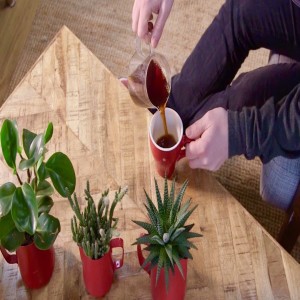
Saturday Jan 19, 2019
Episode 532: Ernesto's Grand Reserve Peaberry
Saturday Jan 19, 2019
Saturday Jan 19, 2019
We've worked with Ernesto Menendez in El Salvador for many years now and if you've been an In My Mug or Hasbean watcher for a little while you'll have probably heard me talk lovingly more than once about his farm La Ilusion, one of my first coffee loves. But Ernesto has got other farms too - who recognises the names Alaska, Los Andes and Los Brumas? They're great coffees we've been lucky enough to enjoy over the years.
The farms, situated on the Santa Ana volcano, don't just get rave reviews from me and you, they're consistent competition winners. Each of Ernesto’s farms has had success in the Cup of Excellence competition and there are very few producers in the world who can boast the kind of consistent placing into the top ranks of this competition that Ernesto has had with his farms.
On top of this, his coffees have been used by not one but two World Barista Champions in their winning performances - and I was involved in roasting both! First, in 2011, La Ilusion was used by Alejandro Mendez of Viva Espresso in El Salvador. Alejandro rocked Bogota and became the first Barista from a coffee producing country to take home the title. That was followed up in 2017 by a familiar face to In My Mug watchers - our very own Dale Harris bringing home the top spot from South Korea using Las Brumas. So, there’s some pedigree to the coffee you have today.
Ernesto has great farms - but which one are you drinking? Well, the answer is it’s a mix! Ernesto’s Grand Reserve Peaberry is one we haven’t had for quite a while now, but which I’m excited to have back. Each year, the peaberries from Ernesto’s farms are separated out and he cups the lots before making a unique blend from them. It’s a blend of Washed and Natural lots from all the farms - a super unusual idea which comes from Ernesto being a master of micro-lotting - separating his lots and cupping them all.
In the cup you'll get a light maple syrup sweetness. That delicious sweetness stays the focus, but shifts into sponge cake, with a grating of orange peel appearing alongside it.
- Country: El Salvador
- Department: Sonsonate
- Nearest city: Santa Ana
- Farms: Finca Las Brumas, Finca Alaska, Finca La Ilusion
- Farmer: Juan Jose Ernesto 'Neto' Menéndez Argüello
- Altitude: 1,450–1,700 m.a.s.l.
- Variety: Peaberry
- Processing systems: Washed and Natural
CUPPING NOTES
Maple syrup, sponge cake, orange peel.
Clean cup: (1–8): 6.5
Sweetness: (1–8): 8
Acidity: (1–8): 6
Mouthfeel: (1–8): 6.5
Flavour: (1–8): 6
Aftertaste: (1–8): 6
Balance: (1–8): 7
Overall: (1–8): 6
Correction:(+36): +36
Total: (max. 100): 88
Roasting Information
Medium dark - through first crack and slow it down a little before dropping just on the edge of second.

Saturday Jan 12, 2019
Episode 531: Bolivia Finca Las Alasitas Washed Caturra
Saturday Jan 12, 2019
Saturday Jan 12, 2019
Finca Alasitas is the biggest farm of Fincas Buena Vista in Caranavi where, every year, a festival is held in honour of Ekeko (iqiqu), the God of abundance. It has everything in miniature but in abundance, just like him!
"Buy me!" said Finca Alasitas... And well, we did! It's all in the name...
Finca Alasitas (which literally translates to "Buy me" in Aymaran) is owned by the Rodriguez family who have been doing some awesome things for coffee in Bolivia. They have their own mills and process and export coffee for farmers all over the Caranavi and Sud Yungas region. The family have been sourcing coffee from small coffee producers for three decades, but unfortunately the steady decline of coffee production in Bolivia has put the sustainability of their export business in jeopardy. Without the efforts of people like the Rodriguez family the future of coffee production in Bolivia is at risk of disappearing completely.
Back in 2014, the Rodriguez family bought land in the Caranavi region to showcase their practises and educate other producers in sustainable farming, as well as increasing the overall volume at their mills. Caranavi is located just north of the department of La Paz city, 150 kilometres from the capital, and is the central hub of Bolivian coffee production. Its fertile soils and altitude make it perfect for producing brilliant and unique coffees.
The Rodriguez family prepared the land they bought across 20.6 hectares, where they planted Red Caturra, Java and Geisha. They’ve also introduced a sustainable model for the producers who supply them at their mill, which is built around the three mantras: economical sustainability, social understanding, and environmental awareness - Sol de Mañana.
The family decided that they could make further changes, making things even better, so have taken on the challenge of increasing the production of Bolivian coffee by planting their own new coffee plantations. They are currently also developing woodland on their farm to combat the ongoing issue of deforestation, what superstars!
Finca Las Alasitas is a 20.6 hectare farm that's located at 1,550 metres above sea level in the Bolinda colony of Caranavi, Bolivia. Of those 20 hectares 16 are used to grow coffee.
In the cup this starts on peach squash, sweet but not sharp. It's got a lovely smooth texture which carries it through to finish on a delicate melon note. On top of all that, it's got an aftertaste that makes me think Flumps (that's a delicious British marshmallow treat if you've somehow missed them!)
- Country: Bolivia
- Region: Yungas
- Municipality: Caranavi
- Colony: Bolinda
- Farm: Finca Las Alasitas
- Altitude: 1,550 m.a.s.l.
- Farm size: 20.6 hectares
- Coffee growing area: 16 hectares
- Varietal: Caturra
- Processing method: Washed
- GPS: 15º46'43.07"S 67º32'53.06"O
CUPPING NOTES
Peach squash, melon, marshmallow (Flump).
Clean cup (1–8): 6
Sweetness (1–8): 6.5
Acidity (1–8): 6
Mouthfeel (1–8): 6.5
Flavour (1–8): 7
Aftertaste (1–8): 7
Balance (1–8): 6
Overall (1–8): 7
Correction (+36): +36
Total: (max. 100): 88
Roasting Information
Medium dark - through first crack and extend the development between cracks, dropping just on the cusp of second crack, no more.
"Quick Look" Guide
Peach squash, melon, marshmallow (Flump).
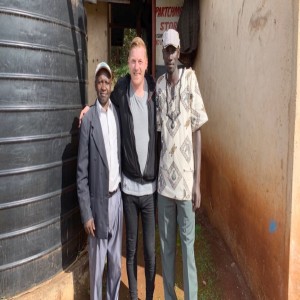
Saturday Jan 05, 2019
Episode 530: Kenya Kieni AA Washed
Saturday Jan 05, 2019
Saturday Jan 05, 2019
The Kieni wet mill is located in Nyeri in the central highlands of Kenya, at an altitude of 1,700 metres above sea level. It's run by the Mugaga Farmers' Cooperative Society.
Nyeri county has cool temperatures and fertile central highlands; it lies between the eastern base of the Aberdare (Nyandarua) mountain range, which forms part of the eastern end of the Great Rift valley and the western slopes of Mt. Kenya. Nyeri town (county headquarters) acts as a destination for those visiting Aberdare National Park and Mt. Kenya. It is in Nyeri county, at the Treetops hotel, (a rustic treehouse hotel) where the young Elizabeth went upstairs a princess and came down in the morning as Queen of England. Her father, King George VI, died on 5 February 1952, the night she spent at Treetops while on honeymoon.
Most of the coffee beans from Nyeri develop and mature slowly, producing extra hard beans. This quality is also evident in the cup. As a result, Nyeri is traditionally known as the heart of Kenya’s black gold coffee.
The coffee is mainly grown on the slopes and the upper plateau where most of the farmers' homes are located. The farms are demarcated into small family plots where each individual family looks after their own coffee.
The mill has recently installed an electronic weighing system, that not only weighs the farmer's cherries when they deliver them - it also prints out a receipt for them, including a running total of how much they have delivered so far.
Kieni is one of a number of mills owned by the Mugaga Farmers' Cooperative, and currently has around 1,000 members, although this constantly varies and not all members will always deliver their cherry to Kieni.
This coffee is wet processed. It's pulped, fermented (soaked for 8-16 hours (with fresh water at 8 hours) and then fermented for 8 - 16 hours) before being washed and then dried slowly over 2–3 weeks, while the moisture content is reduced to 10–12%. Random interesting fact, the depulper at Kieni can manage up to 5,000kg per hour.
In the cup this is about the acidity. Think a lime and tonic, with a little orange zest on the side. There's a little fruit sweetness to balance it but the finish is still crisp and clean. In the aftertaste you get a little hint of redcurrant, super interesting.
- Country: Kenya
- County: Nyeri
- Mill: Kieni
- Society: Mugaga Farmers’ Cooperative Society Limited
- Farmers: 905
- Acreage farmed: 202 acres
- Altitude: 1,700 m.a.s.l.
- Varietal: SL28
- Coffee grade: AA
- Average annual rainfall: 1,680mm
- Average annual temperature: 12–27°C
- Soil type: red volcanic soils that are rich in phosphorus, and which are drained well
- Processing method: Wet processing (Washed)
- Drying process: Dry, milling after the parchment has dried
CUPPING NOTES
Lime & tonic, orange zest, redcurrant.
Clean cup: (1–8): 7
Sweetness: (1–8): 6
Acidity: (1–8): 7
Mouthfeel: (1–8): 6
Flavour: (1–8): 6
Aftertaste: (1–8): 6.5
Balance: (1–8): 6.5
Overall: (1–8): 7
Correction: (+36): +36
Total: (max. 100): 88
Roasting Information
Medium - push this through first crack, into the gap and drop just before you reach second crack.
"Quick Look" Guide
Lime & tonic, orange zest, redcurrant.
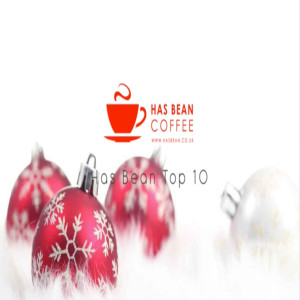
Tuesday Jan 01, 2019
Has Bean Top Ten 2018
Tuesday Jan 01, 2019
Tuesday Jan 01, 2019
In a special edition Roland And Steve go through their top ten coffees of 2018. Sorry for the horse and the length but we had fun doing and editing :)

Saturday Dec 22, 2018
Episode 529: Christmas Espresso Blend
Saturday Dec 22, 2018
Saturday Dec 22, 2018
The Hasbean festive tradition continues for its thirteenth year, iiiiiiiiit's Chriiiiiiistmaaaaaaaas!
Each and every year since 2006 we've released Christmas blends to celebrate this wonderful time of year, and 2018 is no different. This is our Christmas espresso blend, designed to give you a bostin' 'spro or milky drink when you need it most - power through that prezzie wrapping.
Although the name says espresso blend don't write it off if you're not an espresso drinker, we designed this blend with espresso brewing in mind but because of the way we roast you can throw it at any brew method and get delicious results.
This blend will only be roasted throughout the month of December. Some fella in a red suit (no, not me!) said so, make sure to enjoy it while you can!
- 50% El Salvador Ernesto Peaberry
- 30% Yemen Markaz Natural
- 20% Kenya Karogoto Washed AB
In the cup... it’s Christmas! Think Christmas pudding - dried fruits and sherry with brown sugar, followed by a gentle hint of sweet spice on the finish. Don’t forget some dark chocolate for afters too!
CUPPING NOTES
Christmas pudding, dried fruit, sherry, brown sugar, dark chocolate.
Roasting Information
Medium dark - this one's a little tricky with these coffees together, so you need a moderate amount of development and drop the roast just as you reach second crack.
Brew Recipe Recommendation
Dose: 18g
Yield: 40g
Time: 30-32 seconds

Friday Dec 21, 2018
Episode 528: Christmas Filter Blend
Friday Dec 21, 2018
Friday Dec 21, 2018
The Hasbean festive tradition continues for its thirteenth year, iiiiiiiiit's Chriiiiiiistmaaaaaaaas!
Each and every year since 2006 we've released Christmas blends to celebrate this wonderful time of year, and 2018 is no different. This is our Christmas filter blend, designed to deliver a delicious cup of festive filter to help keep you going this December.
Although the name says filter blend don't write it off if you're not a filter drinker, we designed this blend with filter brewing in mind but because of the way we roast you can throw it at any brew method and get delicious results.
This blend will only be roasted throughout the month of December. Some fella in a red suit (no, not me!) said so, make sure to enjoy it while you can!
- 50% Kenya Kieni AA Washed
- 25% El Salvador Finca San José Washed Amarangia Bourbon
- 25% El Salvador Finca San José Washed Elefante
In the cup it's cloudy lemonade and a dusting of icing sugar, with a delicious hit of satsuma. Zingy, sweet and the taste of Christmas morning!
CUPPING NOTES
Cloudy lemonade, icing sugar, satsuma.
Roasting Information
Medium - this needs to go through the gap and nearly up to second crack, but keep it fairly quick.
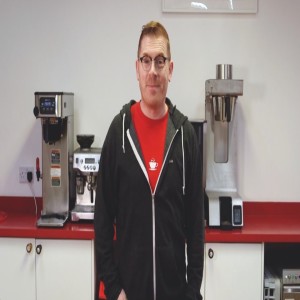
Saturday Dec 15, 2018
Episode 527: Nicaragua Finca Limoncillo Pulped Natural Caturra
Saturday Dec 15, 2018
Saturday Dec 15, 2018
An exclusive coffee only sent to In My Mug subscribers on December the 14th, 2018. I like to spoil you lovely lot whenever I can, and this week is 1 of those weeks! Only enough of this coffee to send out to IMM subscribers, you're getting all of it : )
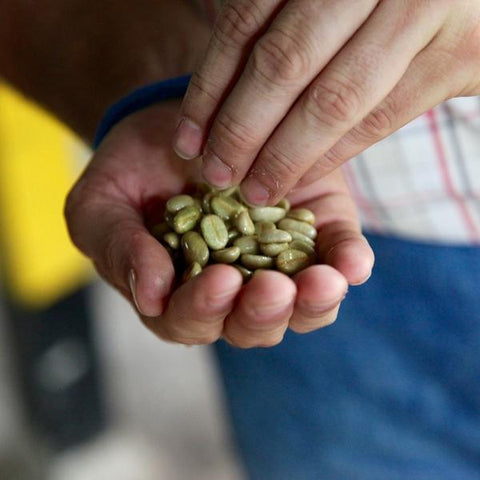
In the cup the first thing that jumps out at me is the texture. It's silky smooth and thick. It's really chocolatey too - think a chocolate bar left in the sun. Although the chocolate is front and centre, there's complexity too, with a little raspberry creeping in to the finish and then a hit of pear on the aftertaste.
- Country: Nicaragua
- Municipality: Yasica Norte
- Region: Matagalpa
- Farm name: Limoncillo
- Farmer: Dr Erwin Mierisch
- Farm size: 171 manzanas (hectares)
- Coffee growing area: 109 hectares
- Altitude: 1,200 m.a.s.l.
- Varietal: Caturra
- Processing method: Pulped Natural
CUPPING NOTES
Silky, chocolate, raspberry, pear.
Clean cup: (1–8): 6.5
Sweetness: (1–8): 6.5
Acidity: (1–8): 6
Mouthfeel: (1–8): 7
Flavour: (1–8): 7
Aftertaste: (1–8): 7
Balance: (1–8): 6
Overall: (1–8): 6
Correction: (+36): +36
Total: (max. 100): 89
Roasting Information
Medium dark - slow it down a little and aim for the first pops of second crack on the drop.
"Quick Look" Guide
Silky, chocolate, raspberry, pear.


